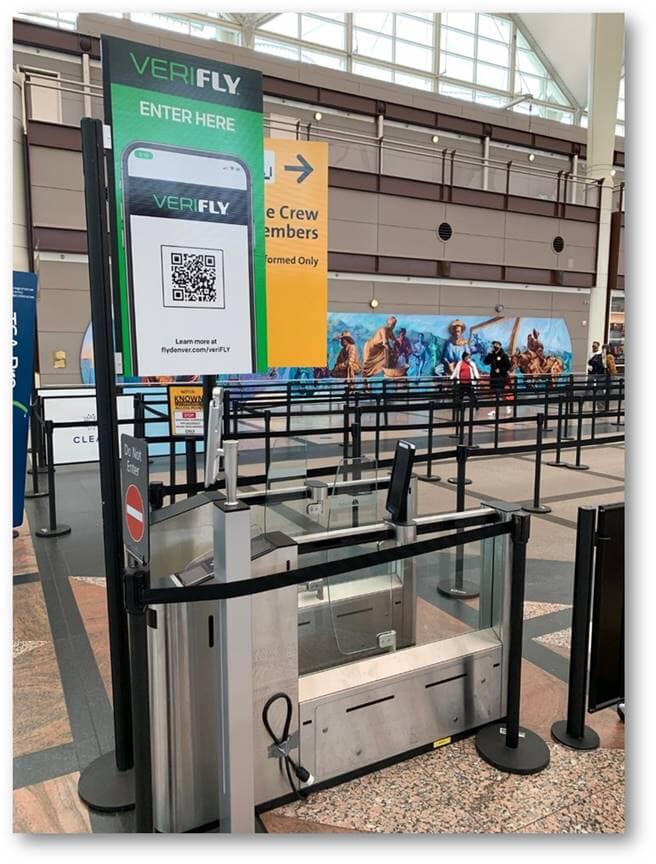
DEN launches VeriFLY to reserve security line reservations
Denver International Airport (DEN) has launched VeriFLY, a new airport experience app that enables health-conscious passengers to make a reservation to access a dedicated TSA screening lane and a reserved limited-capacity, socially distanced train car to the concourse.
DEN is encouraging passengers at higher risk of contracting illnesses to take advantage of this free app, developed by Daon.
Passengers can download the VeriFLY app, create an account, and reserve a 15-minute window before their travel date. On flight day, passengers who have completed a health and temperature screening can arrive at the VeriFLY lane at the south screening checkpoint at their reserved time. Face masks or coverings are mandatory. A touchless, electronic gate will scan their access code, which enables them to proceed through TSA screening (standard and PreCheck lanes available).
VeriFLY allows high-risk passengers to move through key elements of the airport with less contact and congestion and more safety and speed.
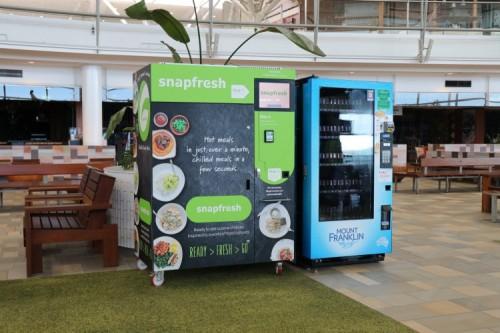
Brisbane Airport offers vending machine meals
Brisbane Airport and readymade meals provider Snapfresh, have partnered to deliver a readymade meals vending machine, in response to the temporary closure of food & beverage outlets due to COVID-19.
Snapfresh is part of the dnata catering Australian portfolio.
Brisbane Airport Corporation executive general manager-commercial Martin Ryan said the machine is a great addition to the International Terminal at a time where passenger numbers are down 98%. “Not only does it ensure there are additional food options available for travelers transiting through our airport, but our staff and employees within the airport can also access delicious readymade meal solutions.”

ANA tests automated towing tractor, baggage loader at Kyushu Saga airport
All Nippon Airways (ANA) is testing an innovative autonomous towing tractor and an automated baggage loader at Kyushu Saga International Airport.
ANA and Toyota Industries worked together to develop the autonomous towing tractor operation as part of an initiative launched by the Japanese Ministry of Land, Infrastructure, Transport and Tourism to incentivize the creation of innovative new aviation technologies. The towing tractor will transport planes that are scheduled for domestic departure during this time. A driver will be present but will only intervene if deemed necessary.
In addition to testing the performance of the towing tractor, ANA will also link the vehicle to its new automated baggage loader—which has been in use since March—to observe how the two devices operate together. By automating baggage and cargo handling operations, ANA is promoting its “Simple & Smart” airport ground support operations, aiming to create an easy and comfortable working environment with less labor and personnel.
The loader is capable of independently loading items of up to 30 kg, taking roughly 26 seconds to properly stow a bag in its correct location. In recognition of its success ANA will expand its use during the trial period, using it to load baggage received from passengers onto aircraft by connecting to the autonomous towing tractor. ANA will closely monitor how the two devices interact, as it looks to develop additional automated technologies that can be used in airports.

Hawaiian Airlines offers drive-through COVID-19 testing
Hawaiian Airlines, in partnership with Worksite Labs, will offer drive-through COVID-19 tests in select US mainland gateways to bypass the Hawaii’s quarantine order.
From Oct. 15, the airline will begin offering the Droplet Digital PCR shallow nasal swab tests. Travelers who test negative within 72 hours of departure will be exempt from Hawai‘i’s 14-day quarantine upon arrival.
The drive-through PCR testing costs $90 for results within 36 hours, or $150 for day-of-travel express service.
Hawaiian’s initial labs will be operational near Los Angeles (LAX) and San Francisco (SFO) international airports, with more testing locations coming soon at its other US mainland gateways.
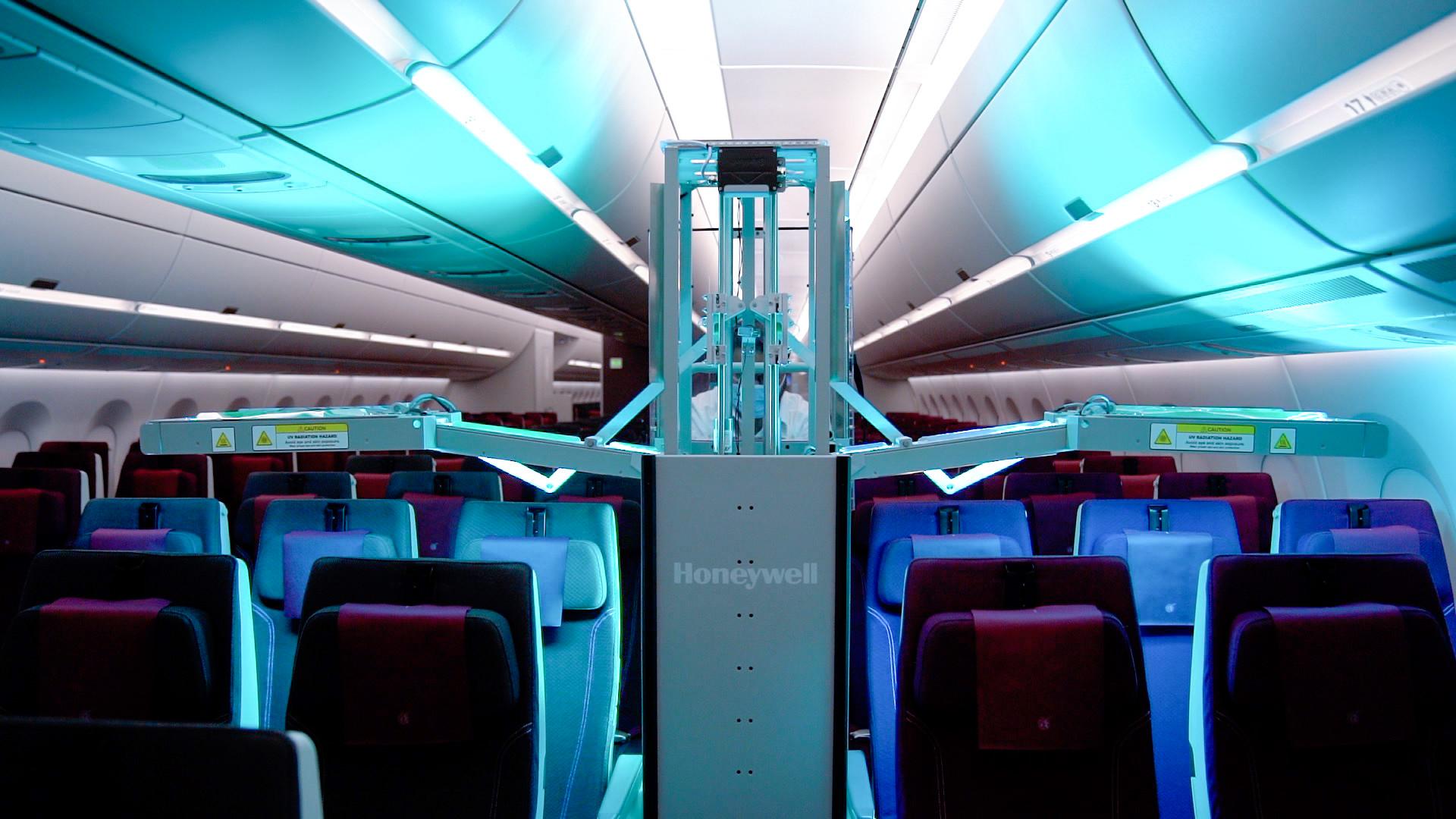
Qatar Airways uses Honeywell’s UV cabin cleaning technology
Qatar Airways has become the first global carrier to operate Honeywell’s Ultraviolet (UV) Cabin System, further advancing its hygiene measures onboard. In clinical tests, UV light has been shown to be capable of inactivating various viruses and bacteria when properly applied.
Approximately the size of a beverage cart, the system has extendable UV arms that treat aircraft seats, surfaces and cabins without using cleaning chemicals.
Having already received six of the Honeywell UV Cabin System, the devices have undergone comprehensive testing onboard Qatar Airways aircraft, before entering service. The airline aims to acquire additional units in the near future, in order to operate them onboard all aircraft turnarounds at Hamad International Airport (HIA).
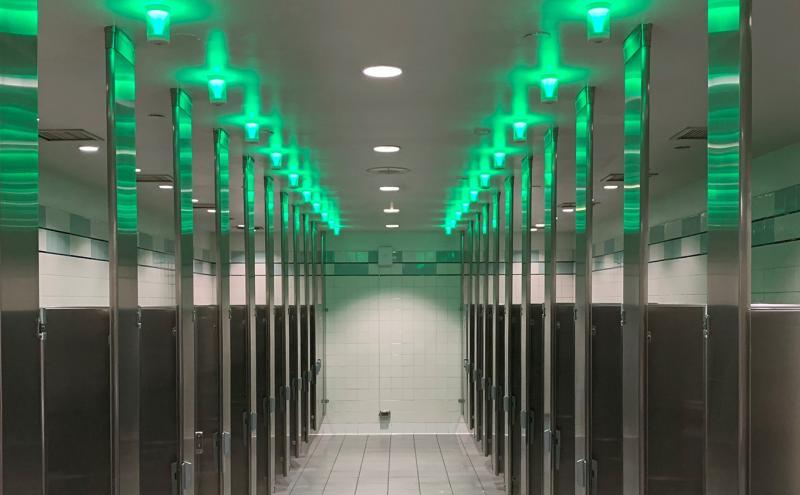
SEA’s restroom innovation gets green light
Seattle-Tacoma International Airport (SEA) installed Tooshlights in the restrooms near Gate C14 to pilot the industry’s first and only automated LED lighting system that increases traffic flow and creates more opportunities for physical distancing. Red lights overhead indicate a stall is occupied and green lights communicate a stall is available for use. SEA said the smart restroom solution “adds more privacy, improves physical distancing during the pandemic, and prevents the need for passengers to push or touch stall doors to determine availability.”
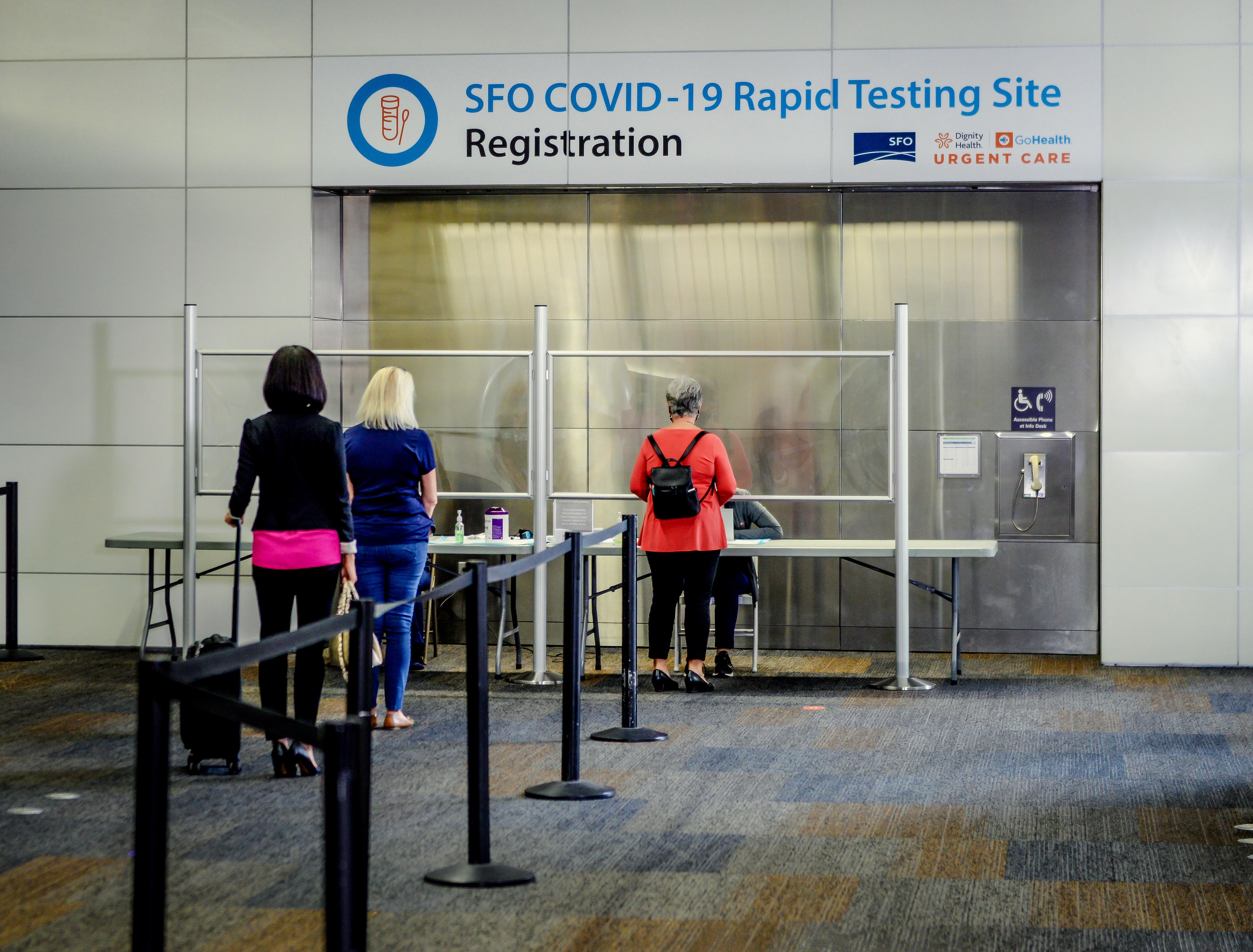
United launches COVID-19 testing program for travelers
United Airlines became the first US airline to launch a COVID-19 pilot testing program for travelers that could make it easier for them to manage quarantine requirements and entry conditions of popular destinations around the world. From Oct. 15, customers traveling on United from San Francisco International Airport (SFO) to Hawaii will have the option to take a rapid test at the airport or a self-collected, mail-in test ahead of their trip.
The rapid Abbott ID NOW COVID-19 test—administered by GoHealth Urgent Care and their partner Dignity Health—provides results in approximately 15 minutes and will be available to United customers on the same day as their flight departing from SFO. The mail-in test option will be administered by Color and it is recommended that customers initiate testing at least 10 days prior to their trip and provide their sample within 72 hours of their trip.
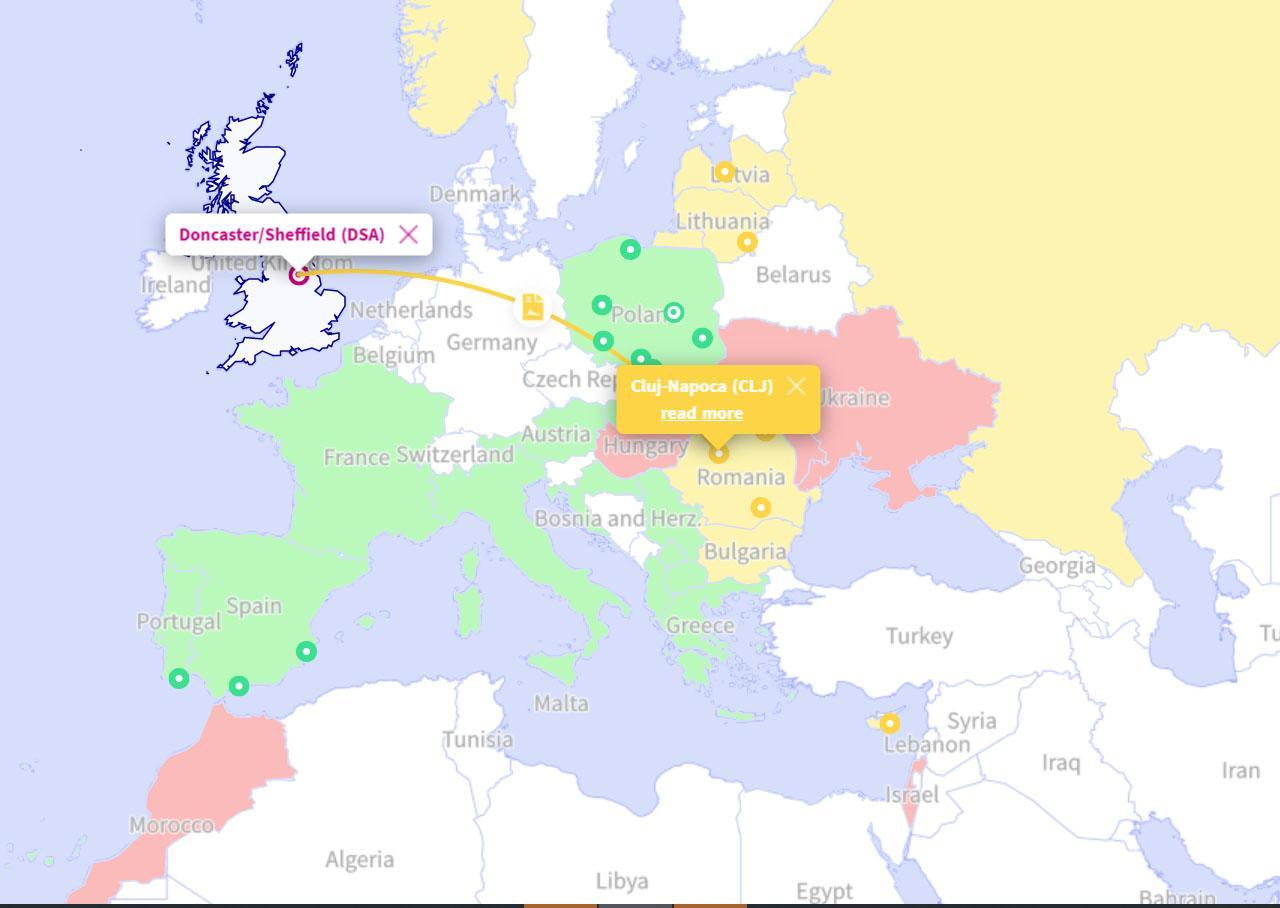
Wizz Air unveils interactive COVID map
European ULCC Wizz Air introduced an interactive website map feature to show prospective travelers the health regulations covering their destinations.
The Budapest-based airline’s Travel Planning Map product allows passengers to check operating routes and relevant travel rules using a color-coded system.
To use the feature, passengers access the online map and click on their planned departure airport. They can then choose from all available destinations on the company’s route map.
Countries and airports are color-coded depending on restrictions: green indicates there are no restrictions to entering the country by air; yellow denotes there are partial restrictions to enter the country, such as the need to undertake a health test, or quarantine upon arrival; and red indicates there is a full or partial entry ban to the country via air.
Finavia to use UVC technology to disinfect security bins
Finavia will start disinfecting security control trays with UVC light technology that kills bacteria and viruses. During the pilot project, equipment based on different technologies will be tested at a number of security control lines.
The disinfection technology tested at the airport is based on UVC light, used for the cleaning of surfaces in, among others, health care and the food industry. UVC effectively destroys bacteria on surfaces.
The aim is to first carry out a pilot to gain experience of the new technology. The pilot involves testing of a variety of different equipment in order to find the product that best suits the airport environment.
The technology is supplied among others by the Finnish company LedFuture Oy, which delivered a pioneering LED-technology based disinfection solution for testing by Finavia.
According to LedFuture, the UVC-LED disinfection technology is energy efficient, environmentally friendly and quick in comparison with traditional cleaning methods, and it is based on research by the University of Helsinki, the University of Eastern Finland and the Finnish Institute for Health and Welfare.
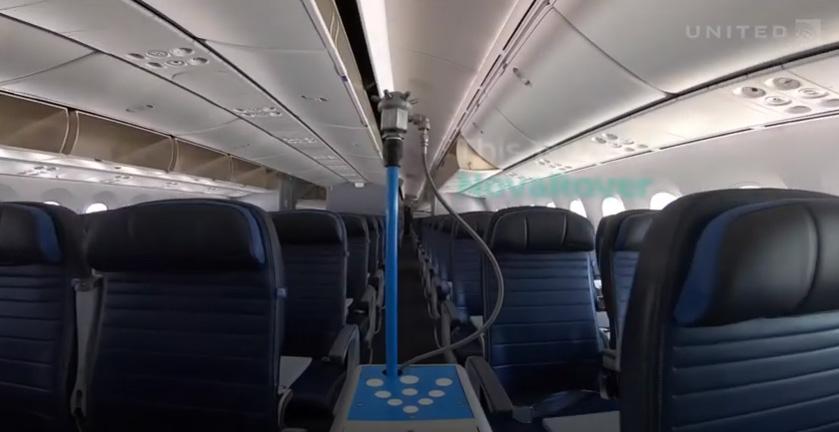
United Airlines adds antimicrobial spray to cabin cleaning protocol
United Airlines is adding Zoono Microbe Shield, an EPA-registered antimicrobial coating that forms a long-lasting bond with surfaces and inhibits the growth of microbes, to the Chicago-based airline’s safety and cleaning procedures. United is currently applying the coating each week on more than 30 aircraft to seats, tray tables, armrests, overhead bins, lavatories and crew stations and expects to add this latest measure to its entire mainline and express fleet before the end of the year.
The antimicrobial coating, created by Zoono Group Limited, a New Zealand Company and distributed in the US by MicroSonic Solutions, will serve as an added layer of protection that complements the airline’s existing, daily electrostatic spraying regimen before departing flights.
The Zoono Microbe Shield works by bonding to surfaces and creating a protective layer that resembles microscopic pins once dry, which rupture cell walls and membranes when microbes come in contact with them. The chemical is classified by the EPA as Category IV, which is the lowest level of toxicity. During an aircraft’s deep cleanings, United will use the NovaRover which is designed to apply a super fine mist of the antimicrobial that coats all surfaces in a 12-foot radius with a single spray. United will apply the antimicrobial to aircraft overnight every seven days using electrostatic sprayers to refresh and fortify the protective layer, while continuing to electrostatic spray disinfectant to the aircraft cabin before almost every departure.

Boeing, Healthe work to produce UV wand to sanitize cabins
Boeing entered into a patent and technology license with Florida-based Healthe Inc., under which Healthe will manufacture an ultraviolet (UV) wand designed to sanitize airplane interiors.
Boeing designed and developed the UV wand as part of the company's Confident Travel Initiative (CTI) to support customers and enhance the safety and well-being of passengers and crews during the COVID-19 pandemic.
Healthe will produce and distribute the commercial wand, helping airlines and potentially others combat the coronavirus pandemic. The technology could be available for airlines in late fall. The device is an addition to sanitizing and protective measures already in place, which include the use of high-efficiency particulate air filters that trap more than 99.9% of particulates and prevent them from re-circulating back to the cabin.
The UV wand uses 222 nanometer UVC light. Research indicates 222 nanometer UVC inactivates pathogens effectively.
Using the self-contained apparatus that resembles a carry-on suitcase, crews can pass UV light over high-touch surfaces, sanitizing everywhere the light reaches. The UV wand is particularly effective in compact spaces and sanitizes a flight deck in less than 15 minutes.

Finnair to offer COVID testing
Finnair has teamed up with private Finnish healthcare service company Terveystalo to offer customers easy and fast access to coronavirus testing prior to travel. The service will launch Sept. 28, 2020.
Some countries require a negative coronavirus test result and a certificate from passengers arriving in the country. The partnership between Finnair and Terveystalo ensures that customers are provided a test certificate required by the destination country conveniently and in a timely manner. Furthermore, Finnair’s customers get access to testing services at a discounted price and with the possibility to buy with Finnair Plus points.
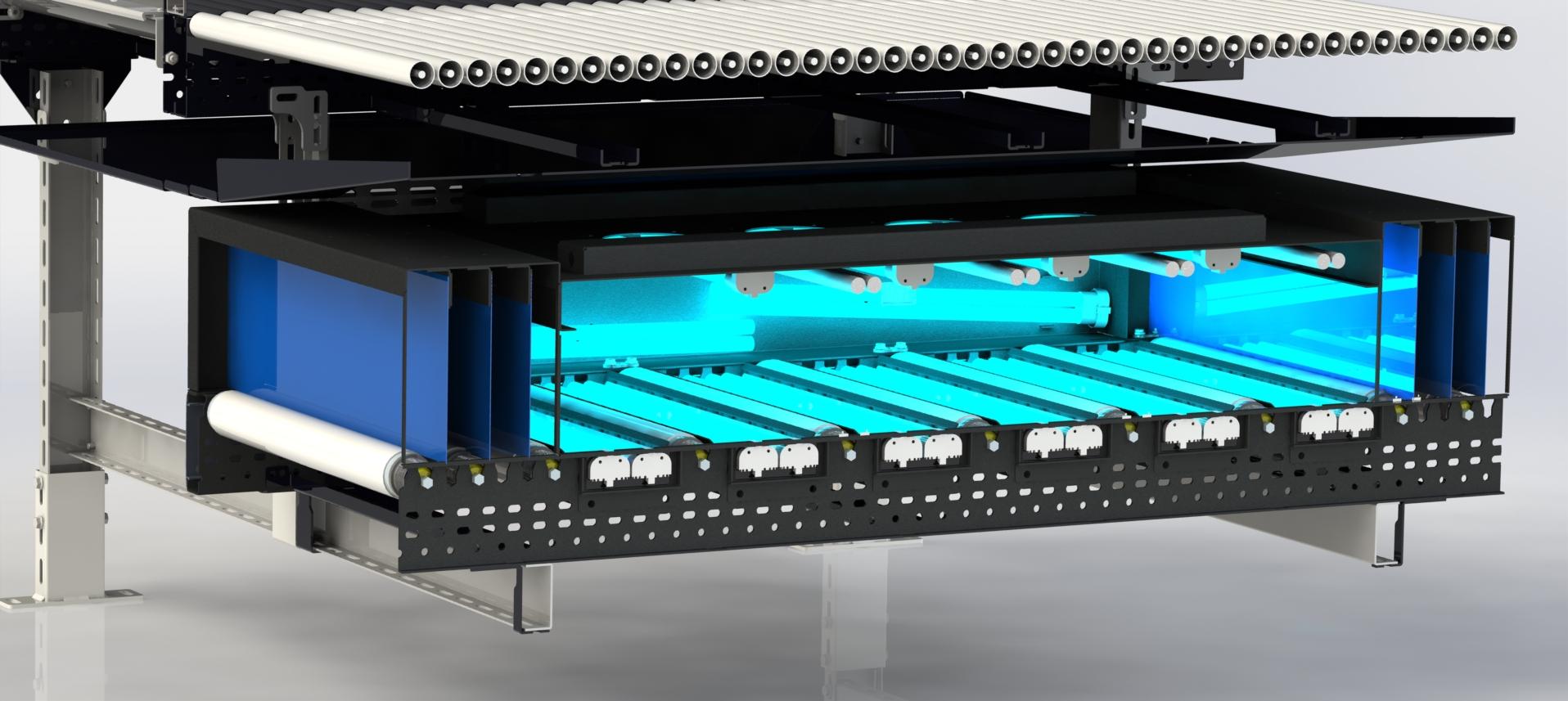
Gatwick rolls out UK’s first UV security tray treatment
London Gatwick is the first airport in the UK to treat its security trays with enough UV light energy to guarantee a 99.9% microbe disinfection rate to protect passengers and staff, and reduce the spread of coronaviruses and other infections on this high-touch surface area.
The new, highly effective system—provided by Smiths Detection—sees each tray pass through a covered “UV-tunnel” fixed underneath the hand luggage screening system, as trays exit the scanners, so that every tray is treated immediately before each passenger uses it.
Following a one-month trial on a single security lane in July 2020, with laboratory testing demonstrating a 99.9% microbe disinfection rate, the new system will be rolled out on eight lanes in Gatwick’s North Terminal—six for passengers and two for staff—by the end of September.

Delta, TSA introduce antimicrobial bins at five airports
Delta is rolling out antimicrobial bins in partnership with TSA as part of the Delta CareStandard. The bins are in automated screening lanes in Atlanta, Minneapolis/St. Paul, Los Angeles, New York-LaGuardia and New York-JFK.
The new bins prevent the growth of a broad spectrum of bacteria through antimicrobial technology that is built into the bin and continuously minimizes the presence of microbes throughout the bin’s lifecycle. Delta said the black color and indicators on bin handles “will help customers know their belongings are safely traveling through the security checkpoint protected by this antimicrobial advancement.”

Mumbai Airport introduces SITA mobile-enabled check-in kiosks
Mumbai’s Chhatrapati Shivaji Maharaj International Airport has introduced nearly 50 of SITA’s mobile-enabled kiosks, becoming one of the first airports in India to deliver a completely contactless way for passengers to check in for their flight.
The technology allows passengers to use their mobile device to interact with kiosks. This significantly reduces the need to touch surfaces in the airport and meets the Ministry of Civil Aviation’s new passenger processing guidelines aimed at reducing the risk of spreading COVID-19 infections.
Developed in response to rapidly changing passenger requirements as a result of the COVID-19 pandemic, SITA said the application is a “cost-effective alternative to significant investment in new low-touch infrastructure.” The solution leverages existing common-use kiosks and does not require changes or modifications to airlines’ existing IATA CUSS standard check-in applications.
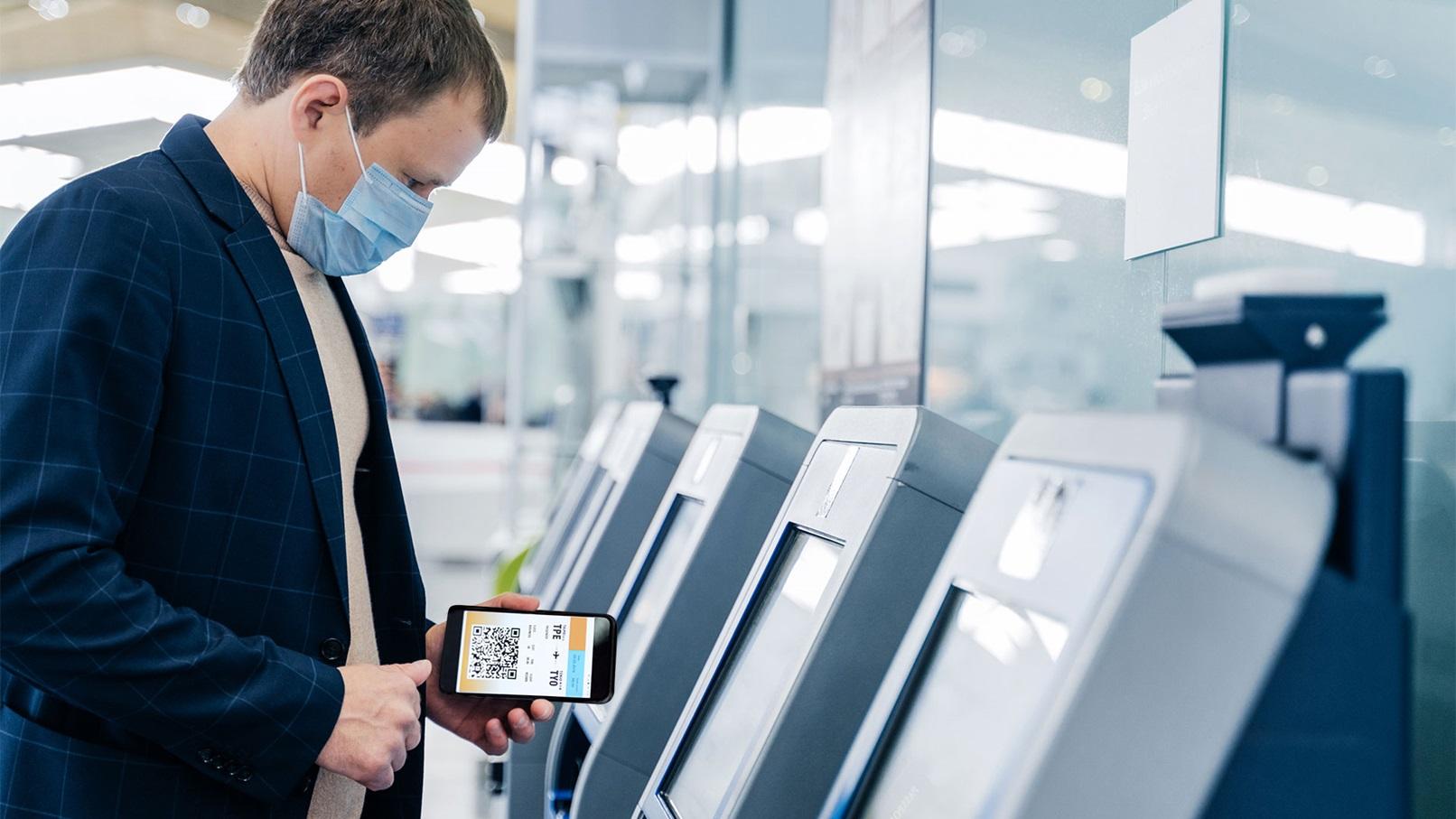
Kiosk Connect by Collins Aerospace gives touchless check-in
Collins Aerospace Systems is eliminating the need to physically touch kiosk screens during airport check-in and baggage drops. The company’s new Kiosk Connect solution provides the first full, end-to-end, contactless airport journey—a high demand as passengers return to travel.
By scanning a QR code with a mobile device, passengers can quickly connect to a common use kiosk using either the airport’s public Wi-Fi or the kiosk’s built-in Wi-Fi, with no requirement to download any apps. From there, users complete the check-in process on their phones and produce boarding passes and bag tags without ever touching the kiosk screen.
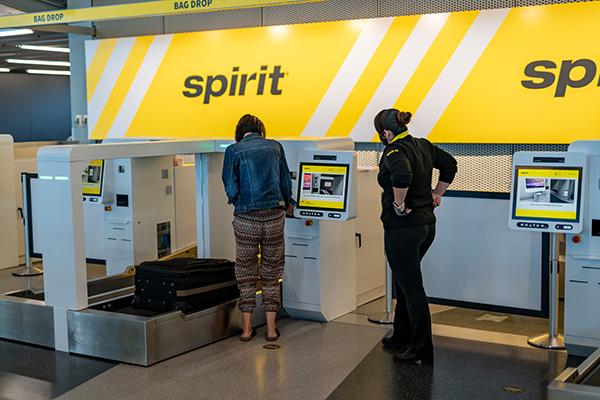
Spirit launches biometric check-in
Florida-based ULCC Spirit Airlines unveiled a redesigned ticket lobby at New York’s LaGuardia and Chicago’s O’Hare International airports with technology designed to limit face-to-face interaction, streamline flight check-ins and get guests onboard quickly. The system requires travelers to tag their own checked in bags and then use an automated self-bag drop unit, equipped with biometric photo-matching, to send the bags to the plane.
Here’s how biometric photo-matching works:
- An agent will manually verify guests’ identification before they approach the self-bag drop units. Guests are advised of the biometric option prior to scanning their boarding pass at the self-bag drop unit. They may either opt in and continue unassisted or opt out. Once the guest opts in, the unit instructs them to scan their ID on the built-in hardware.
- The unit compares its scan of the photo on the ID with a facial scan captured by its onboard sensors, along with comparing identification information with the guest’s reservation details. None of the data is transmitted to any government agency, nor does it leave Spirit’s possession at any time.
- A successful match initiates the rest of the automated bag check-in process. Guests are instructed to place their bags on the conveyor belt attached to the unit, which then scans the bags, weighs them, accepts payment for any additional optional services, and sends them straight into their airport’s checked baggage system without any further action from the guest.
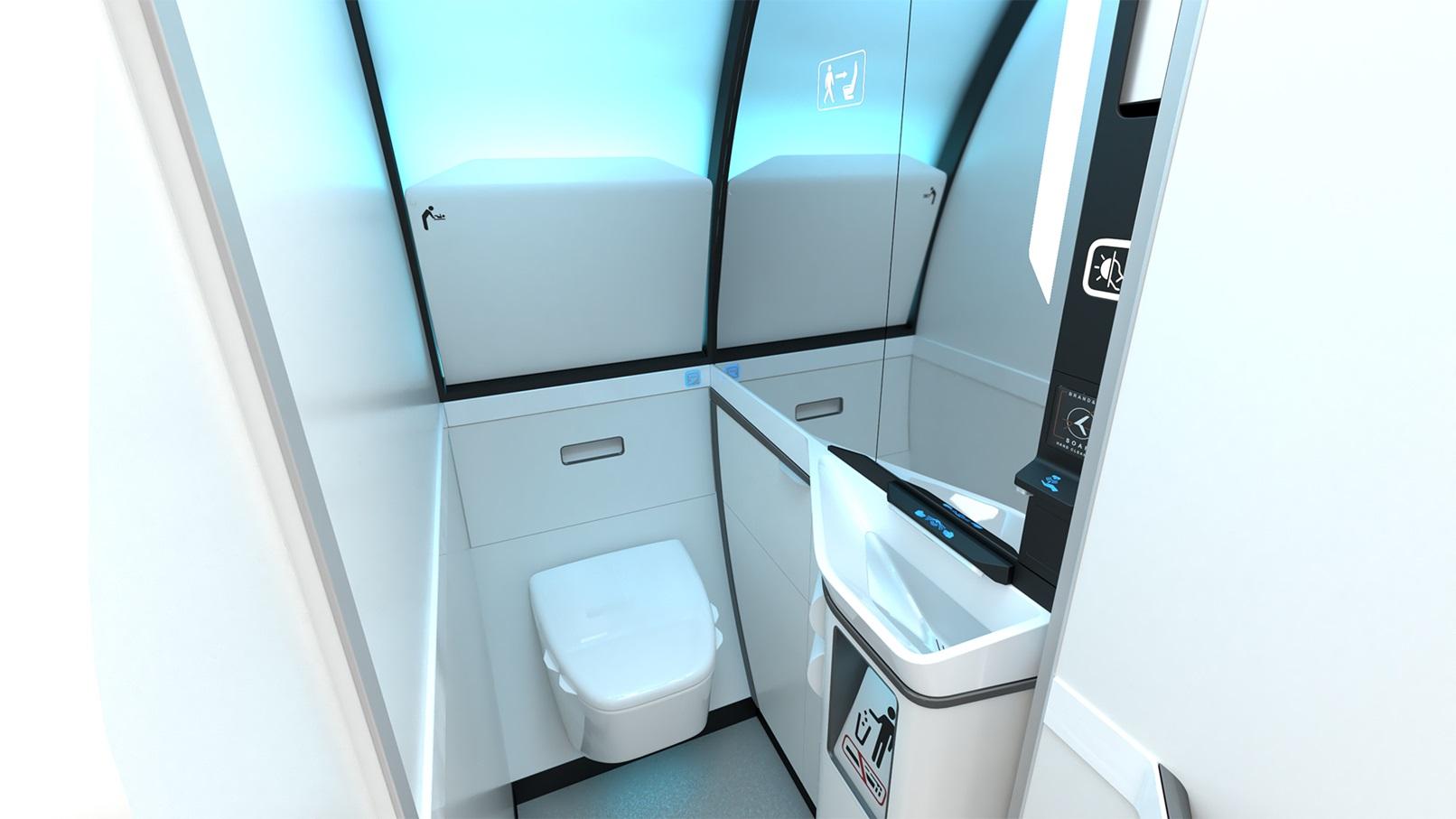
Collins Aerospace to introduce touchless lavatories
Collins Aerospace said it has set out to make aircraft cabins cleaner and safer than ever, from the fabric on the seats to the fixtures in the restroom. “The team’s holistic approach includes touchless lavatories and splash guard-equipped toilets, new antimicrobial surface coatings, specialized lighting and other revolutionary cleaning agents, hand sanitizing stations, air filtration systems and seating options. These solutions can be implemented quickly, efficiently and cost-effectively because they build upon the company’s existing footprint within the cabin.”

Heathrow trials rapid COVID tests
Workers at London Heathrow Airport are trialing three types of rapid-turnaround COVID-19 tests, which could ultimately be used for passenger testing, eliminating the need for quarantine.
The trials aim to establish whether the rapid tests—with results available from 30 seconds to 30 minutes—can efficiently and accurately screen large volumes of people in a non-laboratory setting.
The three types of tests under consideration comprise a 30-minute turnaround test from Gdańsk-based genetic testing specialist GeneMe; a 10-minute test from UK-based diagnostic specialist Mologic; and an AI-based solution from technology firm I-Abra that provides results within 30 seconds.
The GeneMe “RT-LAMP test” uses a nasal or throat swab. A secure app called Yoti is then used to process and deliver paperless test results within 30 minutes, either in-app or via email.
Mologic’s test uses a “lateral flow solution,” where a saliva-based test is processed within 10 minutes.
I-Abra is trialing their “Virolens” testing device. This uses a machine-learning holographic microscope—developed in partnership with Dell/Intel and TT Electronics—to identify a person’s COVID-19 status within 30 seconds, via a self-administered test.
Findings from the trials will go through independent academic evaluation before being shared with the UK government.

Waypoint, Hubbell partner on UV LED light cleansing system
Aircraft engineering company Waypoint Interiors has partnered with South Carolina-headquartered company Hubbell Lighting to develop several new products for safe aircraft environments.
These LED-based products, trade named Viralite, provide two distinct light levels to kill bacteria and disable viruses including the COVID-19 coronavirus.
The product development was started before the pandemic hit and are designed to be a long-term solution to all future viruses and bacteria that we will face in the future. Waypoint engineers have been working with Hubbell’s scientists to design a product that can be used during flight to clean the air and surfaces, and then use UVc light during the overnight stops or on long layovers.
The result of this work has produced a system that can be turned on with the flip of a switch. The naturally clean light provides a system that does not depend on unreliable chemicals, fogs or efforts to wipe down every inch of the plane. Numerous university studies have shown the effectiveness of UV light to disinfect and it has been used in hospitals for years. Light sanitation is environmentally friendly and can be proven to be the most cost-effective means of ridding the aircraft from harmful germs.
Several supplemental type certificates (STCs) are in process with the FAA and have been deemed “safety projects” to allow them to be given top priority.

Aereos makes first built-in antimicrobial high-touch parts for cabins, lavatories
US-based Aereos Interior Solutions has developed line of built-in antimicrobial high-touch cabin and lavatory parts to provide long-lasting protection against harmful microbes, which the US company claims is 99% effective in protecting against harmful microbes.

American first to deploy powerful cabin disinfectant
American Airlines became the first carrier to deploy a new surface-cleaning solution that is claimed to kill 99.99% of coronavirus cells for up to a week after it is sprayed, as airlines look to persuade the public that flying is safe during the COVID-19 pandemic.
Allied BioScience, the developer of the SurfaceWise2 electrostatic spraying solution, bills its new product as the first long-lasting disinfectant approved specifically to fight the novel coronavirus.
SurfaceWise2 works by creating a barrier on surfaces that physically breaks down all viruses and bacteria it encounters. Critically, the antiviral coating continues to kill viruses for up to a week after its initial application via handheld electrostatic spraying machines, forming a long-lasting defense on surfaces like armrests, headrests and tray tables.
The new solution is intended to be a supplement to American’s existing cleaning regimen, rather than a substitute. The Fort Worth-based carrier will continue to manually clean aircraft surfaces in between flights, and its high-efficiency particulate air (HEPA) filters purify air in the cabin once every two to four minutes.
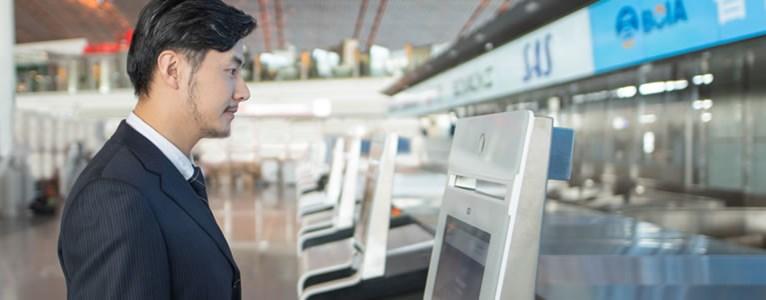
SITA rolls out biometrics, contactless technologies at Beijing airport
Technology provider SITA has rolled out its extensive biometric deployment to date and a new completely contactless experience for passengers traveling through Beijing Capital International Airport (BCIA).
BCIA has completely automated the entire passenger journey using SITA technology—from check-in and bag drop through to immigration, security and finally boarding. Passengers only need to enroll once during check-in, then experience a seamless journey through the airport enabled by facial recognition. Improved processing efficiency means shorter queuing time and more social distancing for all passengers. An added benefit during the COVID-19 era is that the process removes the need to touch any airport equipment, reducing the risk of infection.
The deployment included the implementation of over 600 biometric checkpoints through the airport including 250 lanes of automatic gates, 80 kiosks, and 30 self-bag drop stations which will process passengers from international flights.
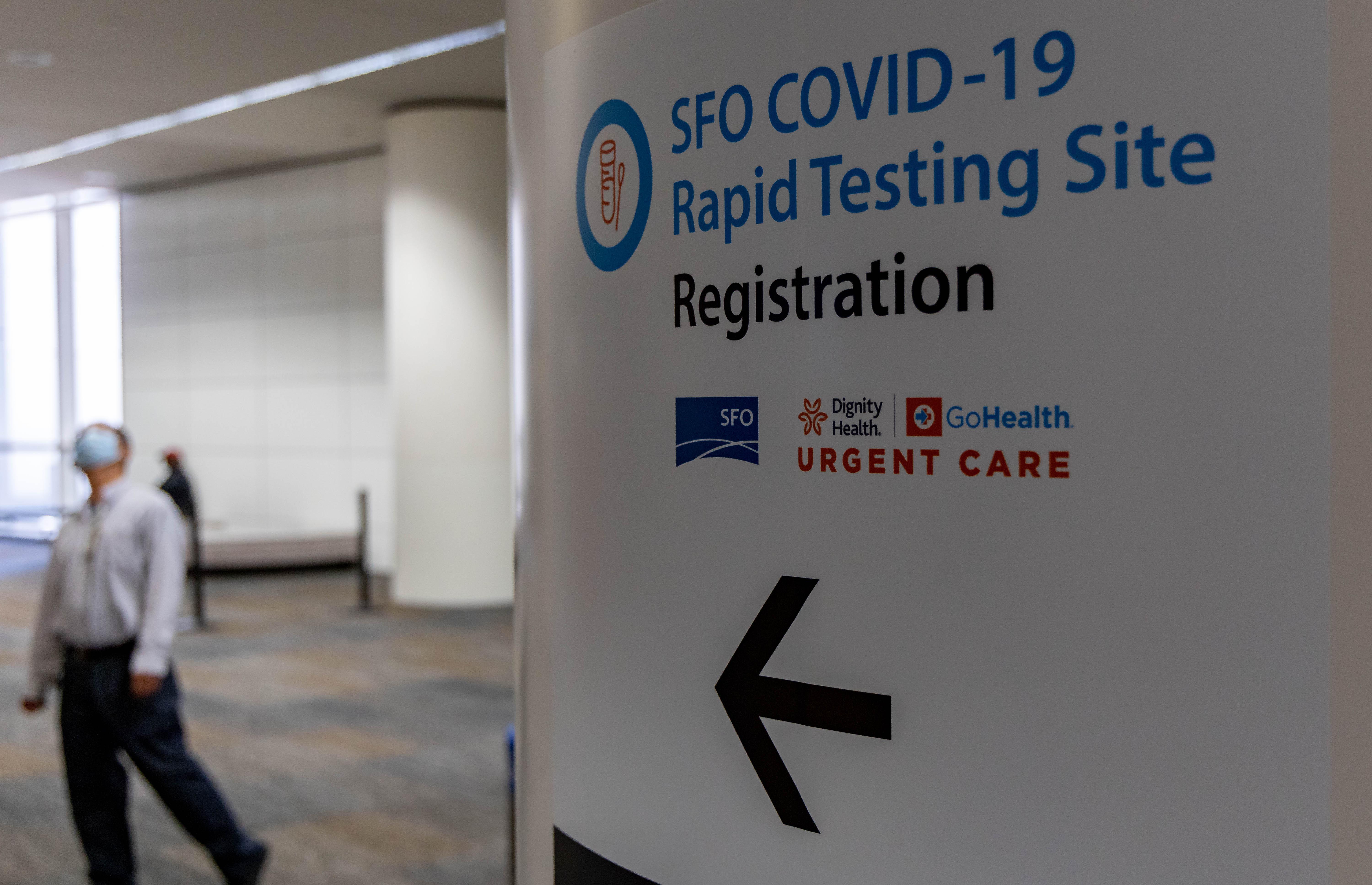
SFO tests airport workers
San Francisco International (SFO) started a program to rapidly test airport workers for COVID-19 on Aug. 24, joining other major airports that have introduced on-site employee testing facilities for the disease.
SFO said the facility managed by Dignity Health-GoHealth Urgent Care at its international terminal is returning test results in less than an hour. The partners started testing airline flight crews in late July.
The airport, located 13 mi. south of downtown San Francisco, requires visitors to wear facial masks and has established protocols to notify employees who may have come into contact with a person who tested positive for COVID-19. As of Aug. 21, the airport said it was aware of 106 employees who had tested positive for the disease.

Satair, Aviation Clean Air partner on Ionization Purification System
Aviation Clean Air, LLC (ACA) and Satair, an Airbus services company, signed a commercial agreement for the distribution of ACA’s Air Ionization and Purification System applicable for all aircraft types.
The agreement was signed Aug. 6.
ACA offers the only proactive system that immediately improves interior air quality and neutralizes pathogens throughout the aircraft. The ACA airborne unit is a patented Air Ionization and Purification System certified by the Federal Aviation Administration (FAA) for aircraft installation This technology deactivates airborne pathogens, viruses and bacteria while congruently reducing Volatile Organic Compounds (VOCs) and odors.
The system uses needlepoint bipolar ionization (NPBI) technology. It works by leveraging an electronic charge to create a high concentration of positive and negative ions. These ions travel through the air continuously seeking out and attaching to particles, setting in motion a continuous pattern of particle combination. As these particles become larger, they are eliminated from the air with increased speed. Additionally, positive and negative ions have microbicidal effects on pathogens, ultimately reducing the infectivity abilities of viruses and bacterial pathogens.
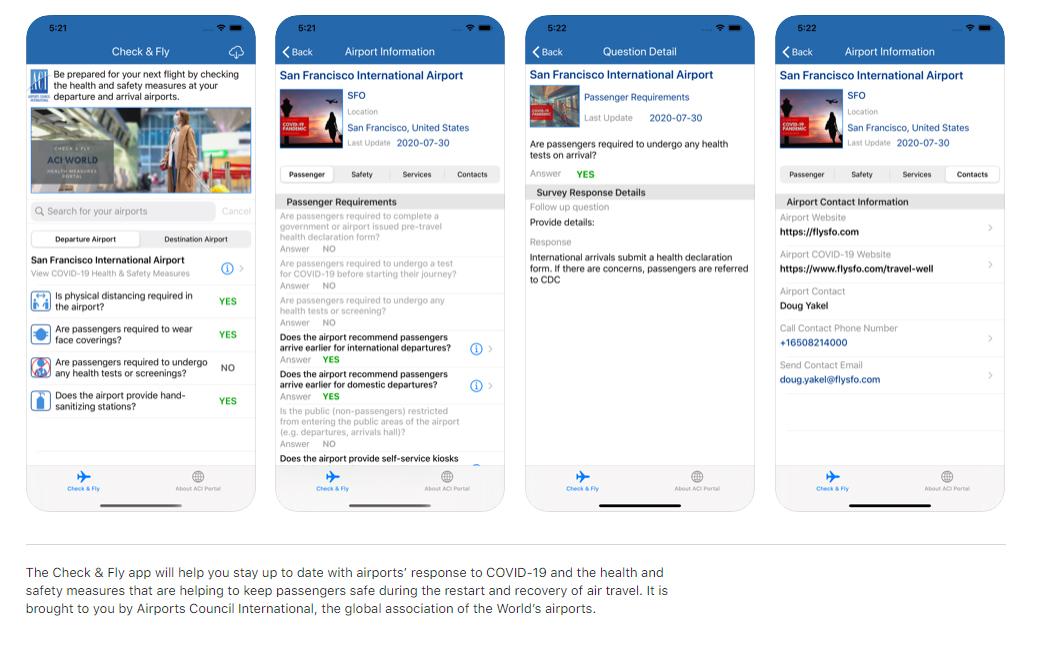
ACI World launches Check & Fly app
Airports Council International (ACI) World launched a new smart phone app that provides passengers with information about the health measures in place at individual airports around the world.
As travel restrictions are gradually lifted, many new health-related measures have been implemented at airports in response to COVID-19. The Check & Fly app provides a way for airports to communicate to passengers directly as to what to expect when they plan to travel, helping them to meet any requirements, and making their journeys smoother and more efficient.
Check & Fly has been developed in partnership with members of ACI’s Airport IT World Standing Committee and is available from the Apple App Store at this stage.

AirAsia Group implements contactless robotic automation
AirAsia Group is accelerating its ongoing digital transformation journey further by implementing robotic process automation (RPA) in collaboration with Silicon Valley and India-based enterprise automation platform JIFFY.ai.
Chief transformation officer Azli Mohamed said, “RPA will allow our workforce to automate mundane and repetitive tasks, which will free up valuable time to focus on other tasks that require thinking and experience-based judgment. RPA will enable us to increase productivity, reduce errors and redeploy resources to higher-value functions. All these benefits will ultimately translate into sizable cost savings and top-line revenue growth,” he said.
AirAsia appointed India- and US-based JIFFY.ai to initiate the RPA adoption, which began in May 2020.
The latest key milestones in the digital transformation journey so far include the implementation of end-to-end contactless procedures in May 2020 to facilitate essential travel. These procedures include contactless payment kiosks, enhanced features on the AirAsia mobile app and contactless kiosks in all operating airports across Malaysia, Thailand, Philippines, Indonesia and Japan.
With the contactless kiosks, guests making their essential travel can print their boarding pass and baggage tag after checking-in online on airasia.com or through the mobile app, ensuring a full contactless check-in process. The enhanced AirAsia mobile app enables travelers to scan their passports via the app itself, further facilitating a contactless check-in process with more features to be progressively added moving forward.
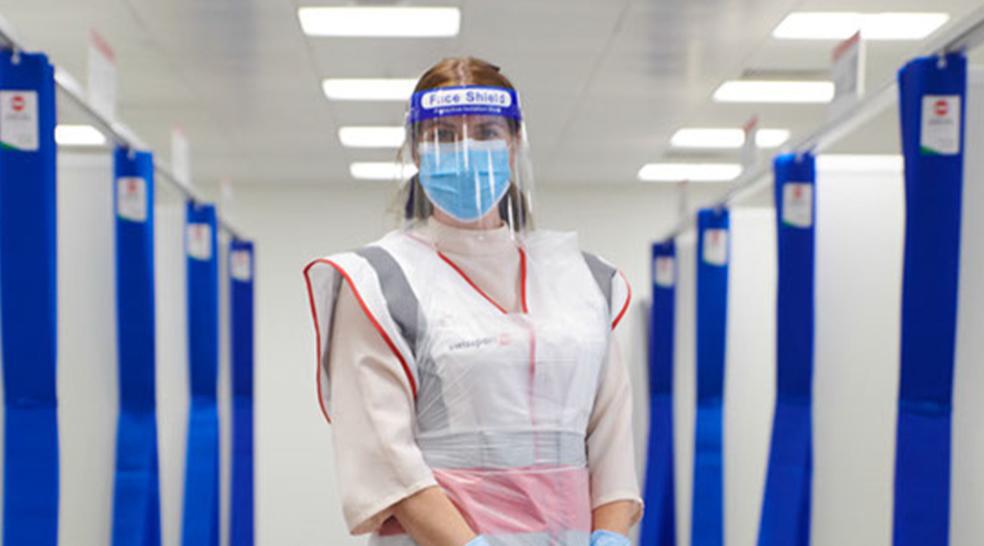
Heathrow COVID-19 testing facility opens
Collinson and Swissport announced their facility for COVID-19 testing is set up and ready for use at London’s Heathrow Airport. The facility in Terminal 2 enables arriving passengers to be tested for COVID-19 upon landing and know just hours later if they have tested positive. More than 13,000 passenger tests can be carried out each day using the existing facility, which can be further scaled with demand. It is hoped that with approval from the government, people testing negative during the process will be allowed to exit quarantine early.
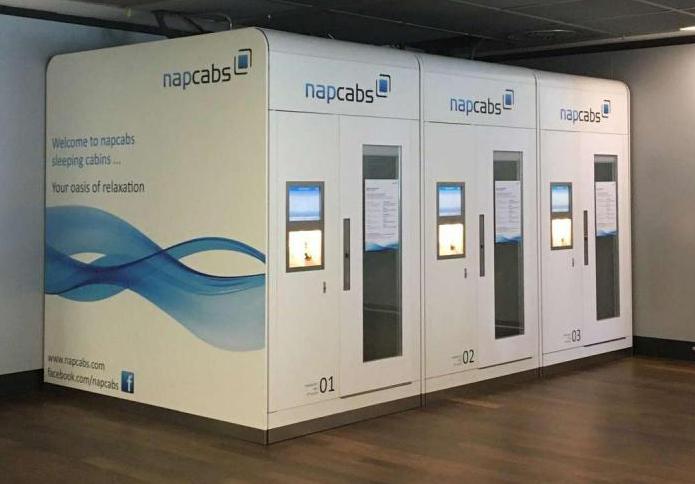
Frankfurt Airport offers NapCabs
Passengers at Frankfurt Airport now have the opportunity to take time out in specially designed NapCabs. Three of these snooze pods are now available in transit area B of Terminal 1. They can be found on Level 3, next to the roof terrace.
The new facilities are designed for transit passengers with prolonged waits for their connecting flights looking for some peace and quiet far from the hustle and bustle of the terminal. With a floor area of 4.2 square meters, the pods are compact but comfortable. The occupant can be sure of total seclusion and privacy. Each cabin is equipped with a bed, workstation and touchscreen with access to videos and music. it also features fully adjustable air-conditioning, lighting, a docking station for an iPod, an MP3 port, a USB charging point, and Internet connectivity. Shower rooms are just a few short steps away.
The minimum rental period is two hours during daytime; between 10 p.m. and 6 a.m. it is three hours. Usage is charged by the hour. During the day, 60 minutes cost €15 ($18), at night the fee is €10. The NapCabs are accessible 24 hours a day, all year round.

Iberia uses sustainable cleaning solutions
Spanish flag carrier Iberia’s service provider Multiservicios Aeroportuarios (MASA) is using innovative and sustainable solutions for cleaning of aircraft and equipment to ensure the maximum hygiene on board and to prevent COVID-19 infections.
In the sanitizing Iberia’s short- and medium-haul fleet in Madrid, MASA has deployed new electrostatic pistols that shoot a fine powder that kills the COVID-19 virus on contact, making the sanitizing both faster and more uniform, while reaching the most inaccessible parts of armrests, headrests, folding trays, seat folds, hand luggage compartments, toilets, etc. between flights.
For the daily deep-cleaning of Iberia aircraft, the Spanish startup AirlineLoop designed an easy-to-use, reliable, and energy-efficient aircraft cabin disinfection system. All exposed surfaces are sprayed with a disinfecting liquid that dries almost instantly.
Airline Loop, Standard Loop, and Portable Loop are the venture’s three types of equipment that can ensure the disinfection of the hardest to reach areas of toilets, galleys, etc.

Copa Airlines details biosafety measures
Copa Airlines announced disinfection, hygiene and biosafety measures and protocols to offer passengers a safe environment at every stage.
These measures have been tested in more than 130 humanitarian flights, carried out by Copa in the last five months, and are being implemented on flights operated in August.
Safe cabin environment: All Copa Airlines’ aircraft are equipped with high-efficiency (HEPA) filters, that remove up to 99.97% of viruses and bacteria. In addition, the cabin air recirculation system renews the airflow every two to three minutes and the air is supplied vertically, which prevent it from being shared among passengers.
Deep disinfection of aircraft: For greater effectiveness during cleaning, Copa uses electrostatic sprayers, that allow for the disinfectant to adhere even better to surfaces that are difficult to reach, in order to guarantee the highest level of hygiene.
Simplified onboard service: To limit the interaction between crew and passengers, onboard service has been simplified, based on the duration of the flights.
New boarding process: Boarding will be from the back to the front of the aircraft, each passenger will carry out the self-boarding process, placing their boarding passes onto the boarding pass reader and showing their documentation to personnel at the door.
Social distancing: Protective plexiglass barriers have been installed in some of the airports where Copa Airlines operates, including Tocumen International Airport.
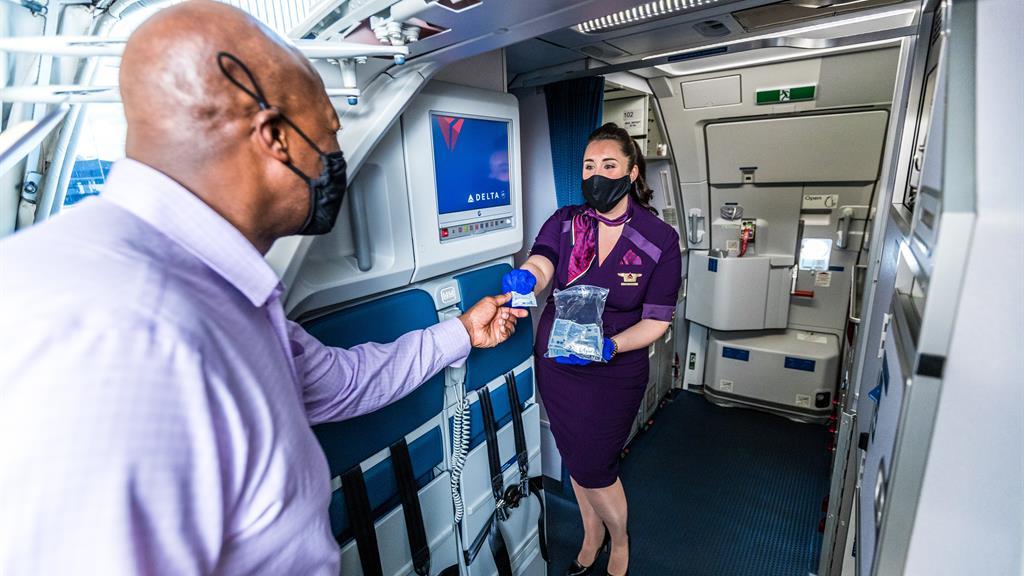
Delta, CVS Health partner on staff COVID-19 testing
Delta Air Lines is partnering with CVS Health to accelerate employee COVID-19 testing with a rapid-response option for flight crews, a move that will build confidence about traveling with Delta among our people and customers alike. The CVS Health Return Ready SM testing will be overseen by a CVS Health clinician at Delta hub crew lounges and takes fewer than 15 minutes to diagnose whether the active COVID-19 virus is detected.

Schiphol offers short connection passes for transfer passengers
Amsterdam Schiphol Airport is now offering travelers with a short connection time the possibility to get through the queues at security and passport control faster. New self-service units have been installed at two piers where many connecting passengers arrive. Travelers can scan their boarding pass and, provided they have a short transfer time, the unit will print their Short Connection Pass. This pass allows travelers with a short transfer to bypass the security and passport control queues.
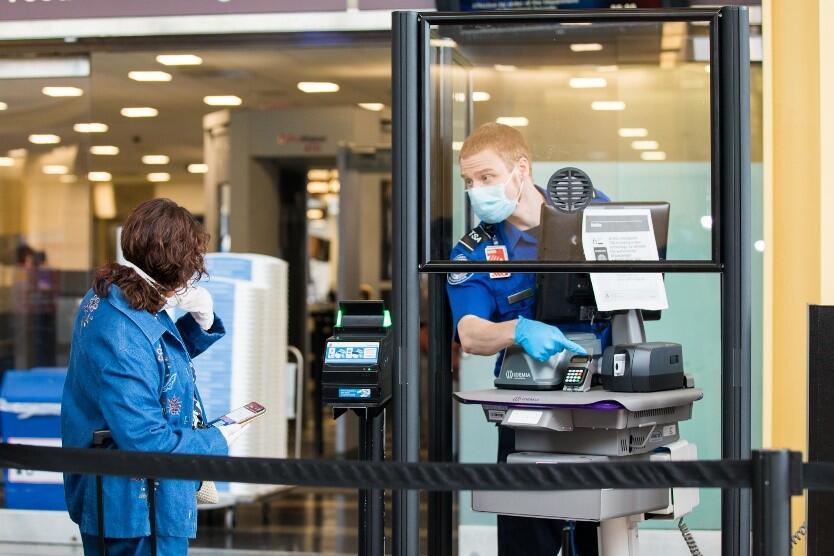
Lavi Industries provides TSA security acrylic barriers
Valencia, California-based Lavi Industries won a contract by the US Transportation Security Administration (TSA) for acrylic barriers and associated equipment for TSA’s security checkpoints at 37 priority airports nationwide. The awarded contract provides rapid deployment at the travel document checking podiums and along the conveyor belts where passengers divest their items for scanning. The priority airports include the nation’s busiest domestic hub locations.
This contract will deliver an additional 1,230 units to augment barriers already installed throughout the TSA checkpoint at various airports and will be completed by early Autumn. The contract was awarded in June and additional barrier contracts will be awarded in September for remaining airport locations.
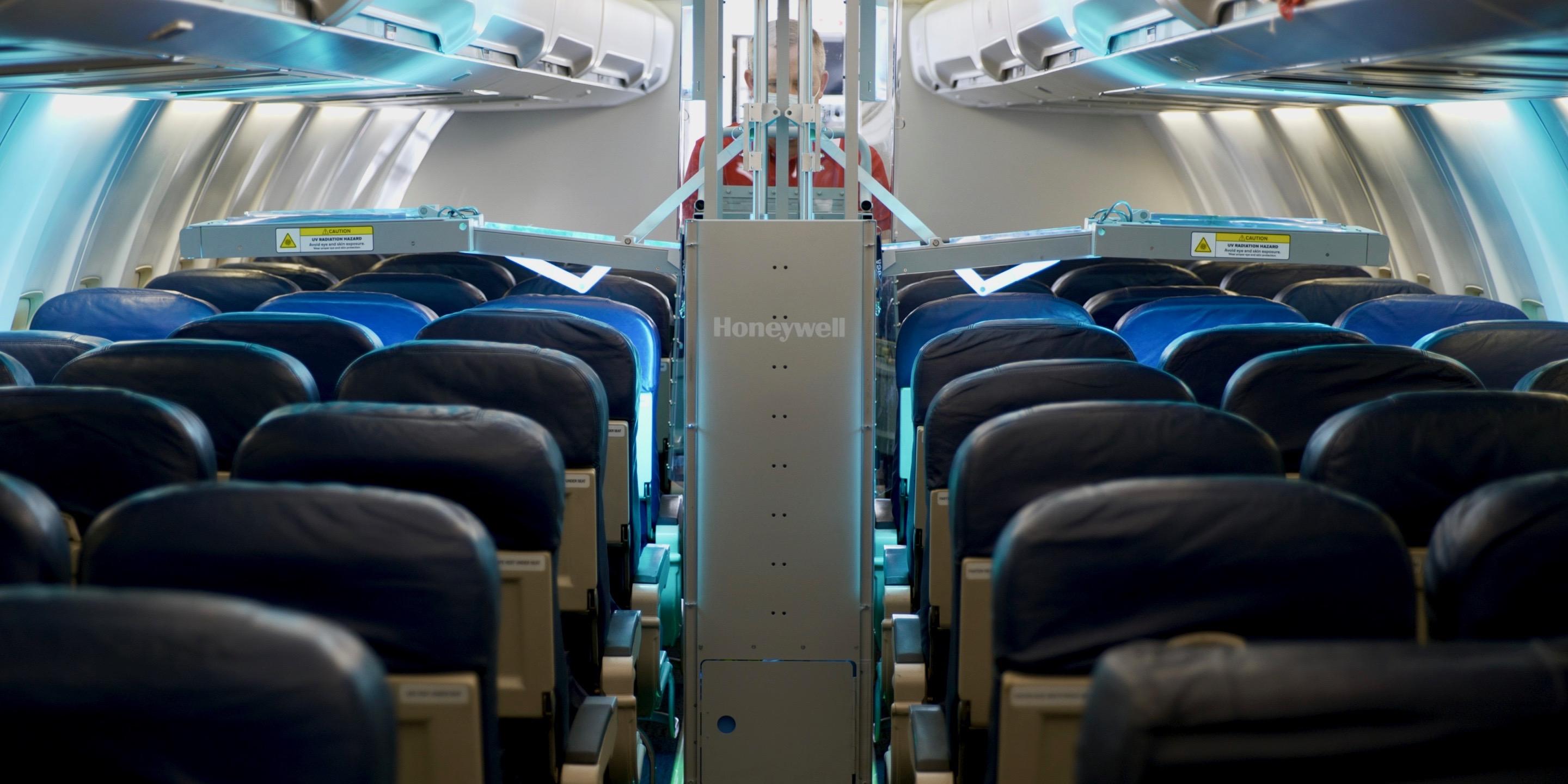
Honeywell’s UV cleaning system used on JetBlue interiors
Honeywell’s new UV Cabin System has been put in service as part of a pilot by JetBlue Airways , marking the first time a US airline has implemented the Honeywell technology. The Honeywell UV Cabin System can traverse an aircraft cabin in less than 10 minutes, and JetBlue will be gauging the system's place in its operation, while continuing other cleaning methods.
Honeywell has delivered eight of the devices to JetBlue, and the devices are now being put into service as part of JetBlue's Safety from the Ground Up program at two of the airline's focus cities, New York JFK and Fort Lauderdale-Hollywood International Airport. These two locations kicked off a 90-day pilot program July 29 for JetBlue to evaluate the Honeywell solution.

United customers can text for cleaning, safety procedures
United Airlines launched a new chat function—the United Automated Assistant—to give customers a contactless option to receive immediate access to information about cleaning and safety procedures put in place due to COVID-19.
Customers can text “Clean” to FLYUA (35982) and get answers to questions about masks, boarding procedures, touchless check-in options and more, without having to call, search online or wait in a line for an answer.
The United Automated Assistant is one of many recent innovations that have been developed to modernize the Chicago-based airline’s service and create a more seamless experience for our customers. This launch follows another recently announced digital product that allows United customers on standby and upgrade lists to receive text notifications once they have been cleared and assigned a seat, saving them time and further limiting person-to-person interactions.
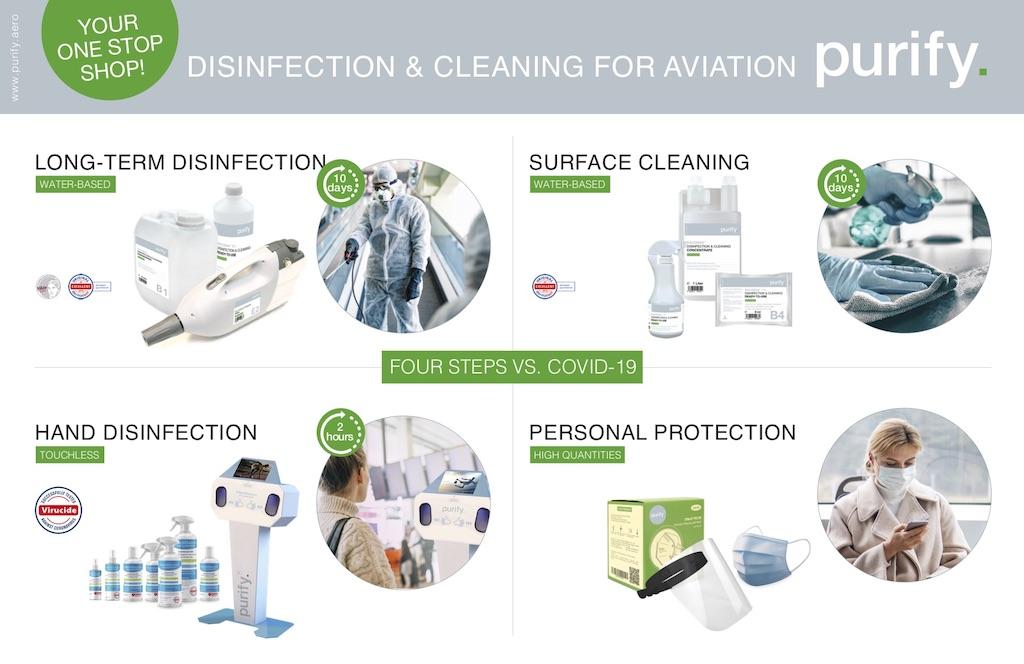
Aviationscouts unveils four-step hygiene concept
A new four-step hygiene concept will allow airports and airlines to relaunch operations while also fight the spread of COVID-19. The disinfection process targets multiple stages of a passenger’s journey, from arrival at the airport, check in, boarding and the flight itself.
A water-based anti-infective for hands prevents reinfection for up to two hours, and because it is water-based it is safe to reapply multiple times. The dispensing device also has an optional infrared thermal camera to test each user for fever. While they wait, a digital screen can show them a short advertisement, thereby providing ancillary revenue that can help pay for the cost of the entire process. This can be increased by further advertising on sachets of the anti-infective issued to the passengers throughout their journey.
Meanwhile, a fogging device releases a surface-cleaning disinfectant in the airport, aircraft and shuttle buses. Able to cover a 100 square meter area in under two minutes, the disinfectant coats surfaces that are frequently touched by passengers and workers, offering long-term protection of up to 10 days.
Finally, face shields, masks and other PPE, can also be branded, for further ancillary revenue.

American Airlines rolls out new touchless check-in
American Airlines is taking more action in advancing its technology capabilities to ease the customer experience and focus on the well-being and safety of customers and team members.
Starting July 17, American created a new touchless check-in experience for customers, allowing them to proceed to the gate without touching the kiosk screen, even if they are checking a bag.
Customers who would like to check baggage and are traveling domestically on a single itinerary can indicate how many bags they plan to check on the American Airlines app or website.
When the customer arrives at the check-in kiosk, they can scan the boarding pass on their personal mobile device or one they printed out at home. After the boarding pass is scanned, the kiosk automatically prints the bag tags, all without the customer having to touch the kiosk. This new technology will be in place at more than 230 airports.
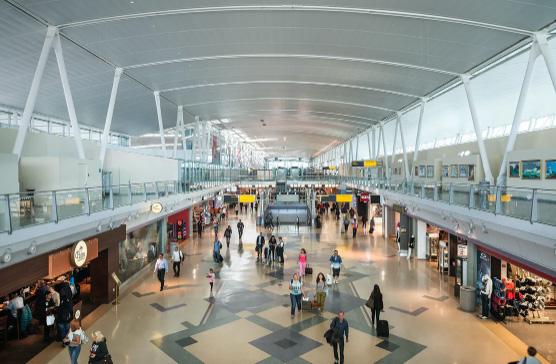
New York JFK launches camera-enable CrowdVision technology in Terminal 4
New York JFK Terminal 4 operator JFKIAT launched camera-enabled CrowdVision technology with new SafeDistance capabilities, making T4 the first air terminal in North America to launch this technology.
As part of JFKIAT’s COVID-19 recovery plan, the new technology will help to monitor social distancing from curbside to check-in and through the security checkpoint in the terminal.
CrowdVision technology helps to measure a variety of metrics within T4, including number of passengers, operational resources and queue times. CrowdVision’s new SafeDistance feature will help to maintain a safe and healthy terminal providing real time alerts on customer separation (how far apart individuals are from one another). The implementation of CrowdVision’s SafeDistance technology will allow JFKIAT’s operations team to identify areas that are too crowded and places where people need to be dispersed or reorganized to prevent any long period of overcrowding or overexposure. Having access to CrowdVision’s real-time data will help JFKIAT to analyze spots within the terminal that have continual crowding, giving employees the ability to make changes necessary to limit crowds and better support those customers with a smooth and safe experience.

Hawaii airports to use passenger screening technology
Hawaii’s airports Hawaii's public airports will use thermal temperature screening and facial recognition technology from EC Corp., NEC Corp. of America and partner Infrared Cameras to help protect the community and identify passengers with a potentially elevated body temperature.
NEC and Infrared Cameras were selected with a proposal of $23.3 million for equipment and installation and a 10-year maintenance plan of $1.42 million annually for a total contract amount of $37.5 million. The companies were selected in part because of their innovative concept and functionality to deliver accurate and efficient thermal temperature screening for people traveling to Hawaii. The selection committee evaluated various systems and technologies and NEC and Infrared Cameras were determined to be the best fit for Hawaii's needs.
The thermal temperature screening equipment will be installed immediately at the Daniel K. Inouye International Airport (HNL), Kahului Airport (OGG), Lihue Airport (LIH), Ellison Onizuka Kona International Airport at Keahole (KOA) and Hilo International Airport (ITO). Phase 1 will have the temperature scanners installed this month at the gates currently being used for arriving trans-Pacific flights.
Phase 2 will have the temperature scanners installed at the remaining gates in the coming weeks.
Phase 3 expects to have the facial recognition equipment installed by Dec. 31, 2020.

Russia’s Sheremetyevo Airport launches express COVID-19 testing
The Russian Direct Investment Fund (RDIF) and Sheremetyevo International Airport announced the launch of express testing for coronavirus using EMG systems.
Sheremetyevo is the first airport in Russia to introduce these medical services for all its visitors.
The express service for COVID-19 diagnostics—which provides a reliable result within 60 minutes—is being introduced at Sheremetyevo Airport ahead of the reopening of international regular air services.
Testing will be available for all passengers from July 20, 2020 at the Terminal B health center (domestic flights) and July 27 at Terminal D (domestic and international flights).

Plusgrade launches Seat blocker technology
Ancillary revenue and merchandising platform Plusgrade, has launched Dynamic Seat Blocker, which elevates how airlines capture incremental revenue, and meet the evolving needs of passengers in a COVID-19 economy. With the launch of Dynamic Seat Blocker, Plusgrade said it “gives passengers the option to social distance inflight, allow passengers to block off the entire row in both widebody and narrowbody aircraft, and can provide every travel party type (singles, couples, families) with their ideal journey.” In addition the company said the product “continues to provide revenue recovery tools to help the airline industry rebound by adding a new type of enhanced seating option for additional comfort and space—improving the overall travel experience.”
Dynamic Seat Blocker is the newest version of Plusgrade’s existing solution, Neighbor-Free Seat, that has been on the market since 2017. Seven carriers are expected to go live with the new product in the next 30 days including Royal Jordanian Airlines, Malaysia Airlines, Oman Air, Philippine Airlines, and Etihad Airways.

SITA, NEC partner on digital identity at airports
NEC Corporation and SITA today announced a global partnership to develop market-leading solutions that enable a secure walk-through travel experience at airports, leveraging NEC’s I:Delight identity management platform together with SITA Smart Path and SITA Flex.
The partnership comes as airports and airlines increasingly look to low-touch and automated passenger processing in order to comply with new hygiene requirements following the global COVID-19 pandemic, in line with recommendations from Airports Council International and IATA.
Through the partnership SITA and NEC will further unlock the potential of seamless next-generation passenger processing solutions, making mobile enabled and touchless airport processes a reality. This will allow passengers to use their digital identity on their mobile phone whenever they travel at each step in the journey. Passengers will use their biometric identity to check-in, make payments, drop their bag, as well as pass through security, immigration and boarding by simply scanning their face at each step. Key touchpoints will automatically recognize you as a passenger, making steps such as bag drop and boarding effortless.
The two companies will collaborate to develop this ground-breaking solution by utilizing both companies’ global presence in the market and the combination of technology for Common Use Platforms and Artificial Intelligence (AI) solutions.
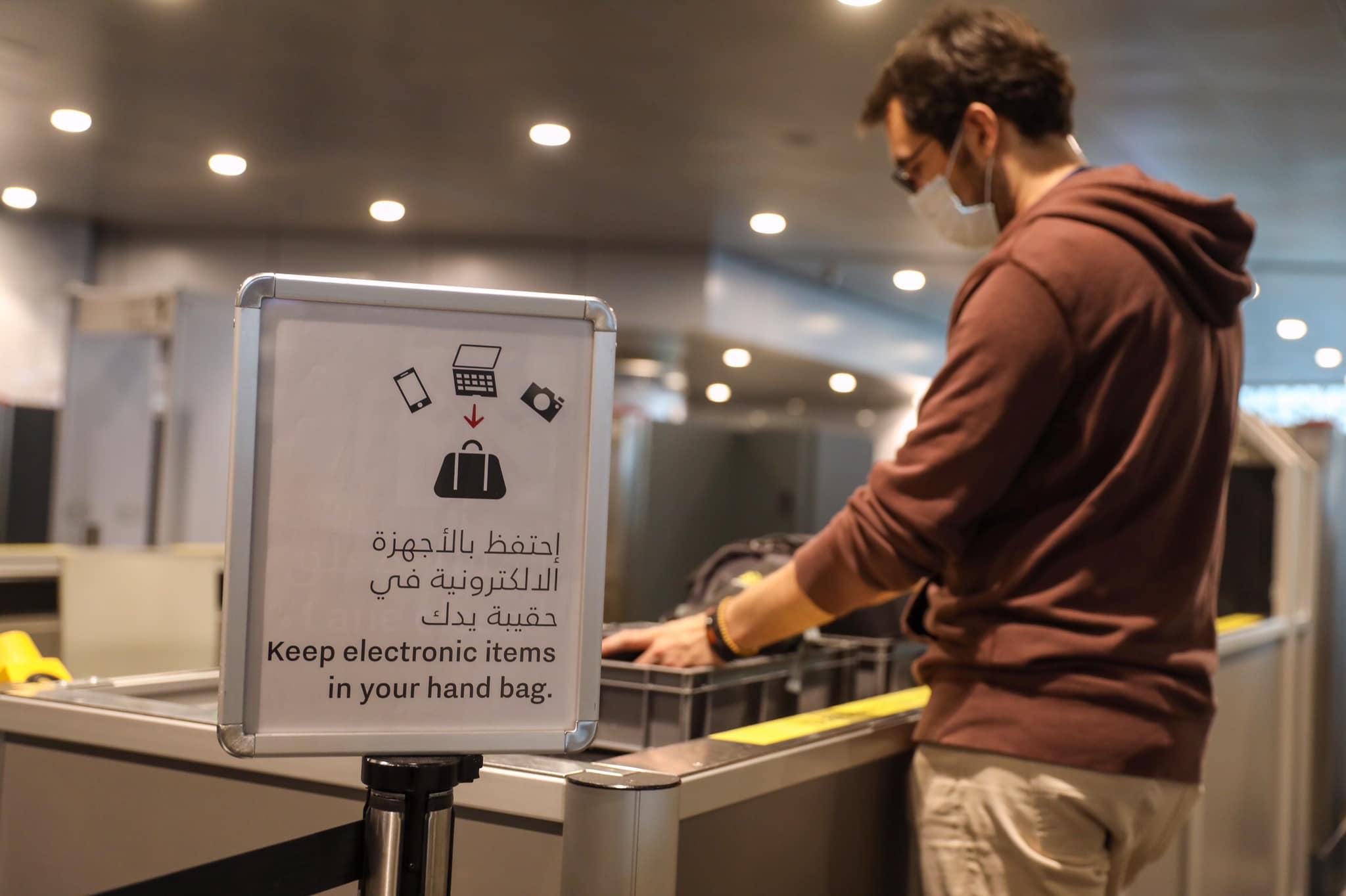
Hamad International Airport installs enhanced safety measures
Hamad International Airport (HIA) installed the latest security screening technology that enables security personnel to easily detect explosive materials held in complex items and structures. The technology also allows transfer passengers the freedom to keep electronic devices—such as laptops, tablets and digital cameras—in their hand luggage while going through security checkpoints.
HIA said the new C2 technology will be initially implemented across all transfer screening checkpoints, upon the gradual reopening of transfer gates. It will significantly enhance airport security while speeding up the inspection process and boosting throughput.
The ECAC C2 Detection standard can identify threat materials in congested bags, including electronic devices that had to be segregated from bags earlier. Once the bag is placed on the X-ray for screening, it can be collected without any further stops for re-screening or physical inspections. The system is also a significant counter COVID-19 measure, that reduces possible cross-contamination among passenger carry-on bags. The implementation of the technology will elevate the airport’s hygiene standards, by limiting human contact at the security checkpoints, making the process safer and faster for both staff and passengers.
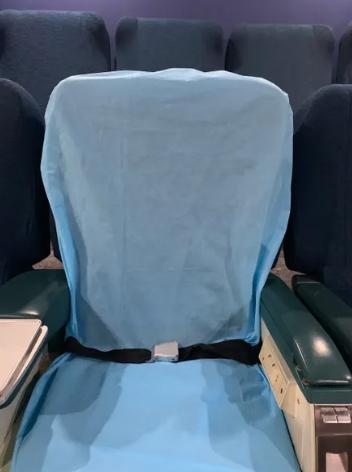
Aircraft disposable seat cover
AviationRFI has produced and is making available a dual seat cover, which will fit both an economy aircraft or car (taxi) seat. “Made of PPE Medical Grade Fabric,” the company says it is “lightweight, disposable and recyclable.” Even though the product can be used more than once, it cannot be washed.

Etihad, Sitata launches interactive COVID-19 travel map
Etihad Airways has partnered with Sitata, a Canadian travel risk management company, to launch an interactive travel map on tihad.com, the airline’s official website. Etihad Airways said its guests now have easy access to a comprehensive overview of the situation relating to COVID-19 at each destination in the airline’s network.
“The travel map uses advanced computer algorithms to detect new travel information globally, which is swiftly updated on its portal. The system also relies on announcements and updates published on official government websites and reputable media channels. The information is vetted by Sitata’s team of editors and continuously updated as and when new information is made available. This provides Etihad‘s guests with a source of easily accessible information to make more informed travel plans,” Etihad stated.
According to Etihad, the map provides important information that can impact travel arrangements including border restrictions, curfew timings, mandatory precautionary measures, quarantine rules, airport and flight operations, and the number of current active COVID-19 cases in each destination. Guests can access the travel map on tihad.com under the destination guidelines section of the website.

Keflavik Airport adopts Veovo live passenger forecasting AI
Airport technology company Veovo launched its AI-powered live passenger forecasting capabilities to prevent airport crowding, improve capacity planning and boost operational efficiency. Veovo said these capabilities will help build passenger confidence in the safety of air travel and accelerate the return to normal passenger levels.
Keflavík Airport (KEF) is the first to adopt the solution, helping to reduce the impact of recent travel volatility and support new distancing initiatives.
The solution draws data from any available sources, including various sensor technologies, airline schedules and booking files, the Airport Operational Database (AODB), queue wait times and lane productivity, event calendar and boarding pass scans. This creates an accurate by-flight forecast of how passengers will arrive and transit through the terminal. The airport can then build a robust resourcing plan to match demand.
The solution continually re-forecasts, based on live data, and alerts the operator immediately when predetermined thresholds are reached. Resourcing and operational actions are recommended to minimize bottlenecks and prevent crowding, such as by adjusting call-to-gate time, changing border control lane openings or reallocating baggage belts. It also allows the airport to understand the cause of the deviation from the plan, which could be anything from a late arrival, to a slower than predicted security process. This insight is then fed back into the future plan to continually improve the forecast accuracy, based on local conditions.

Global alliances produce video to boost customer confidence
The three global airline alliances, oneworld, SkyTeam and Star Alliance, have partnered to produce a one-minute video highlighting the measures airlines are adopting to assure the well-being of customers while travelling.
The YouTube video, “Dear Travellers,” provides a look at what customers can expect on their journeys over the coming months as travel restrictions are slowly eased and the world starts to reopen.
Once customers are ready to fly, the alliances said in a joint statement, “they can do so with confidence, assured that airlines and airports around the world are implementing enhanced hygiene and personal safety standards to mitigate risks to health.”
Included in the measures that travellers will experience during their journey from check-in to their chosen destination are:
- A requirement or recommendation for passengers and airline staff to wear face masks both at the airport and onboard, consistent with applicable public health guidelines
- A safe airport environment with physical distancing in all required areas
- Increased and intensified sanitation with a focus on high-touch areas, both on the ground and in the aircraft cabin
- Hospital-grade high-efficiency air filters on board modern aircraft. Known as HEPA (High-Efficiency Particulate Air), these filters extract 99.99% of particles and airborne contaminants
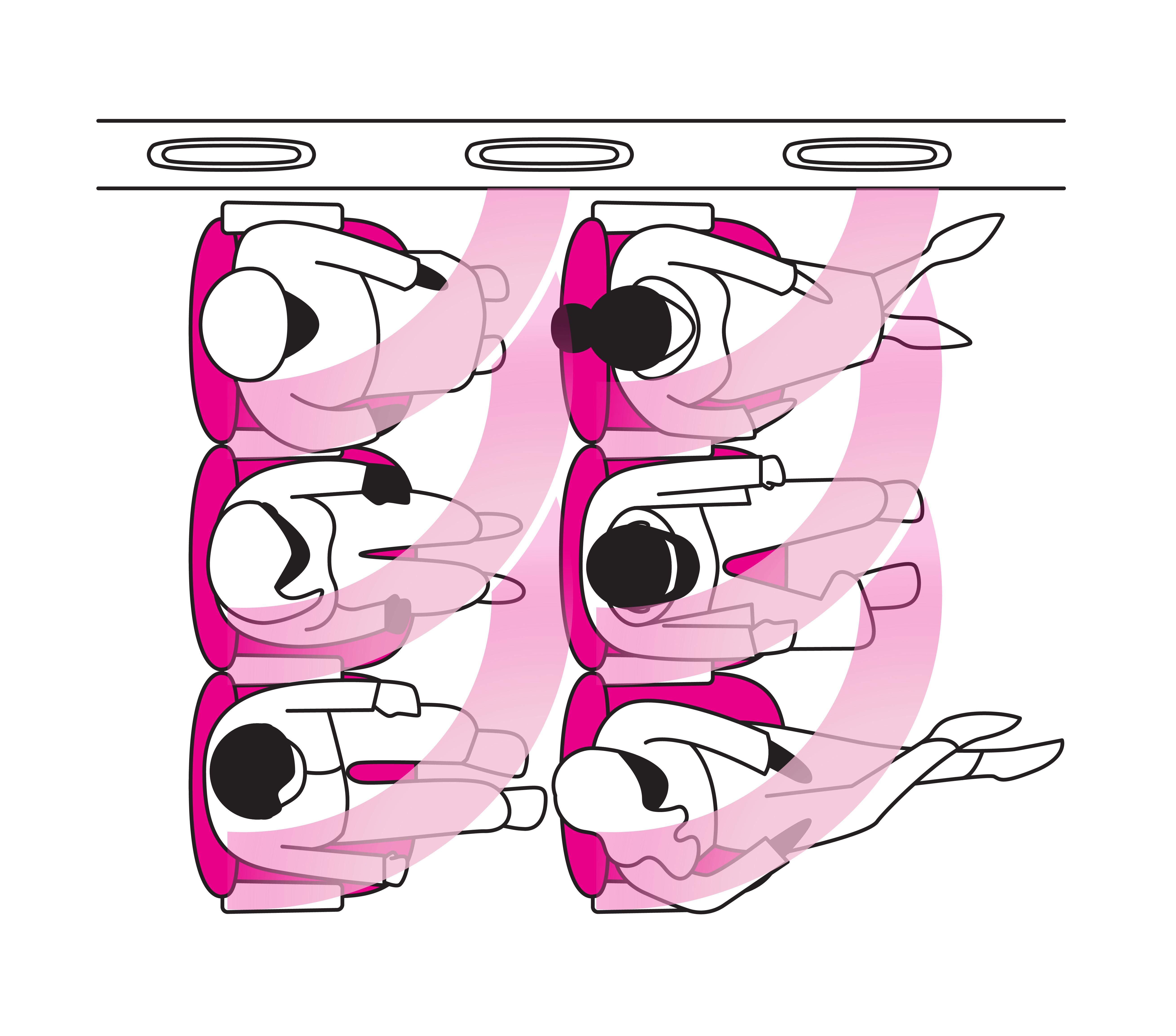
Teague’s AirShield improves gaspers to redirect cabin airflow
Design and innovation design company Teague has come up with a solution called AirShield, which redirects cabin airflow to minimize potential infection.
“In an aircraft environment, it is airflow and not the distance that plays the most significant role in the spread of a virus. By engineering the cabin airflow to manage each individual’s exhalations, passengers can have far greater peace of mind,” Teague senior director of airline experience and co-inventor Anthony Harcup said.
AirShield is a 3D-printed grill that fits over passenger overhead air vents. It controls the spread of airborne droplets by immediately re-directing the air flow downwards and into the aircraft’s HEPA filtration units.
“The simplicity of the design means that with just one grill per seat row, the 60 grills required to fit a narrow-body aircraft could be fitted overnight as a service bulletin,” Teague said.
AirShield is currently in early prototyping and development.
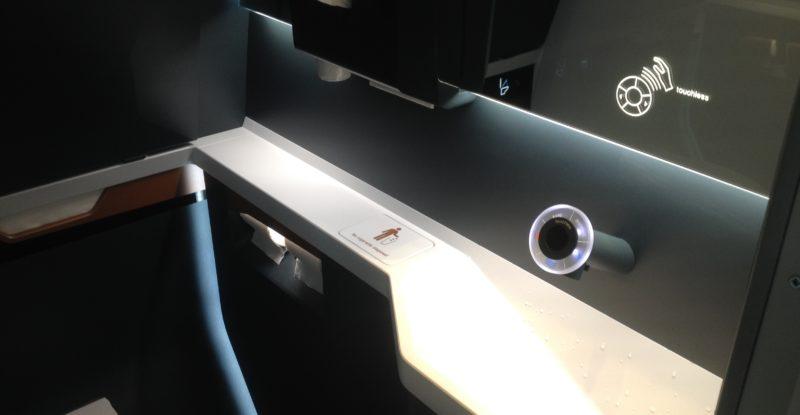
Diehl Aviation unveils Cabin Confidence Concept
In the wake of the ongoing COVID-19 pandemic, Diehl Aviation is stepping up efforts to improve hygienic standards in aircraft cabins, aimed at making post-coronavirus flying safe. The company has launched a product innovation initiative—dubbed Cabin Confidence Concept—addressing the operational challenges that airlines are facing, as well as health concerns of the traveling public.
Diehl Aviation has identified three fields of competence in its portfolio that will help to enable airlines and to enhance passenger well-being on board.
- Diehl Aviation will apply its expertise in environmental control systems to optimize air circulation and humidity in the cabin, as well as disinfecting and purifying the air on board.
- the company has been working for some time on numerous touchless features for the aircraft cabin, particularly for lavatory environments, in order to enhance hygiene on board.
- UV-C technology will be applied as tool for disinfecting surfaces, and for water purification.
Based on these competences, Diehl Aviation is now working on specific product solutions that will be available to the market as soon as possible. In addition, the company offers features for immediate applications such as flight–ready disinfectant dispensers, corona placards for cabin hygiene and hands-free lavatory handles.

HAECO unveils hands-free lavatory sanitation devices
HAECO Cabin Solutions launched three devices to upgrade aircraft lavatories to hands-free operation.
The devices include:
- An electric foot-controlled switch for flushing toilets
- An infrared sensor-based waste basket lid for disposal of toilet waste
- A refillable hand sanitizer dispenser, eliminating the need for disposable sanitizing wipes and paper towels. The dispenser may also be used in other areas of aircraft interiors.
HAECO is offering these upgrades individually, to allow airlines to choose the device or devices that would provide them the most value.
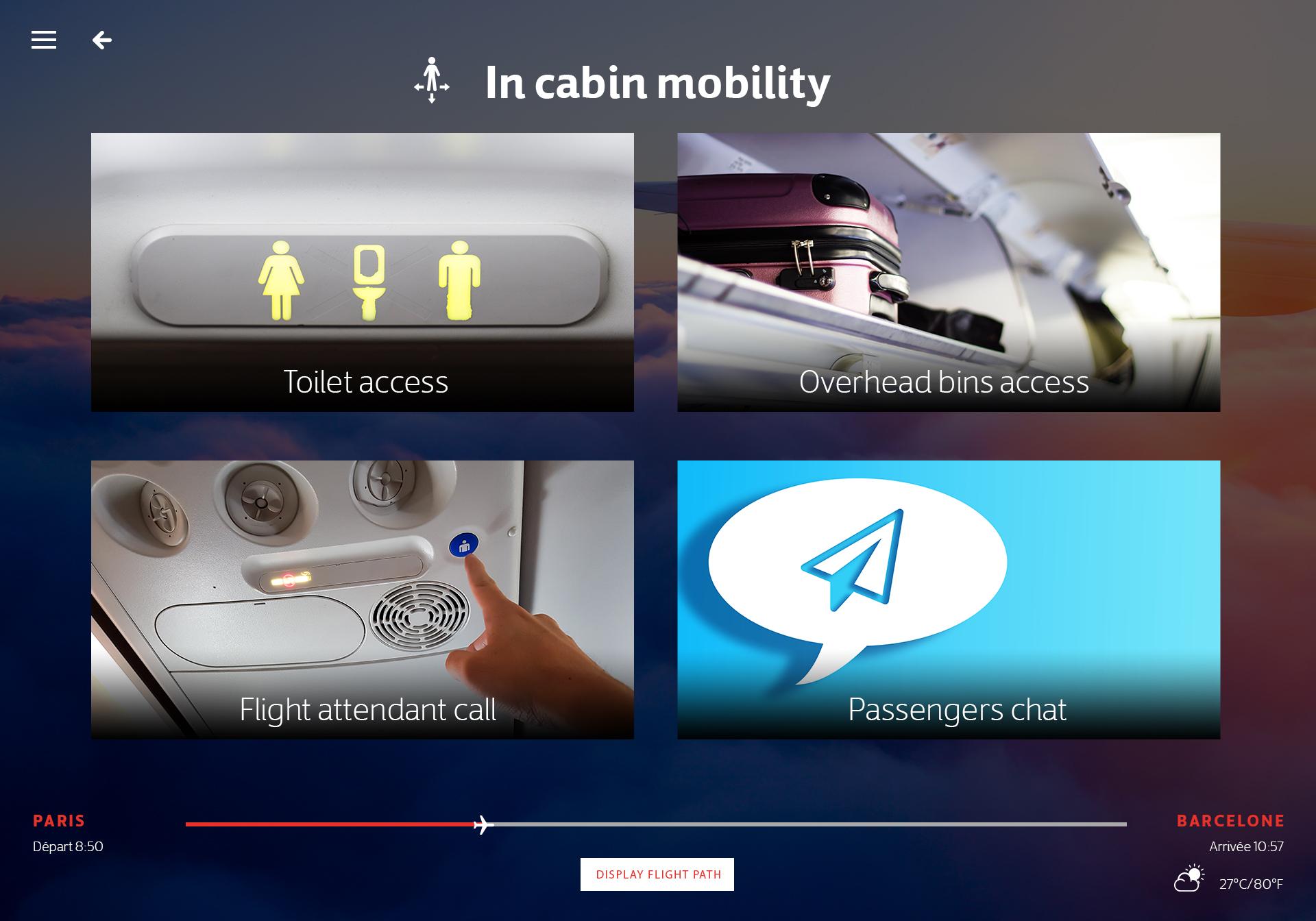
PXCom launches social-distancing management apps for IFEC platform
PXCom has launched the In-Cabin Mobility Management (IC2M by PXCom) software suite dedicated to dramatically improve inflight social distancing.
The suite has four modules the airline can choose either separately or in a bundle:
- Toilets Queuing Management to avoid passengers gathered around the restrooms;
- Overhead bin access regulation to ensure minimum distance as a passenger wants to access to its personal belongings;
- Disembarkation Process, to organize a guaranteed social distance as the passenger leave the aircraft; and
- Multi-chat: Passenger chat to avoid passengers from different rows physically connecting to discuss and also, passenger to cabin crew chat to minimize surface contact.
PXCom CEO Cyril Jean said the company “anticipates a 60% drop down of unmanaged in-cabin movement.”

AtYourGate, Grab partner on contactless airport ordering, delivery
Airport e-commerce platform Grab has partnered with in-airport food and retail delivery leader AtYourGate to provide a range of services to help the aviation industry and passengers as the world re-opens. This strategic partnership will allow airports to provide both pick-up and delivery at participating food & beverage and retail concessions. This also gives flexibility to passengers who will be able to order from their own devices while socially distancing.
Grab’s omni-channel platform allows guests to order through a variety of digital channels. The partnership with AtYourGate will bring the added option of airport delivery, allowing guests to order and have food and retail purchases delivered to their gate while waiting for their flight. Guests will have the ability to order across terminal and security lines, enabling a wider breadth of dining options.
The collaboration is designed to make the process for airports and concessionaires more efficient and stress-free, and customers can still order from the existing Grab and AtYourGate apps while at the airport.
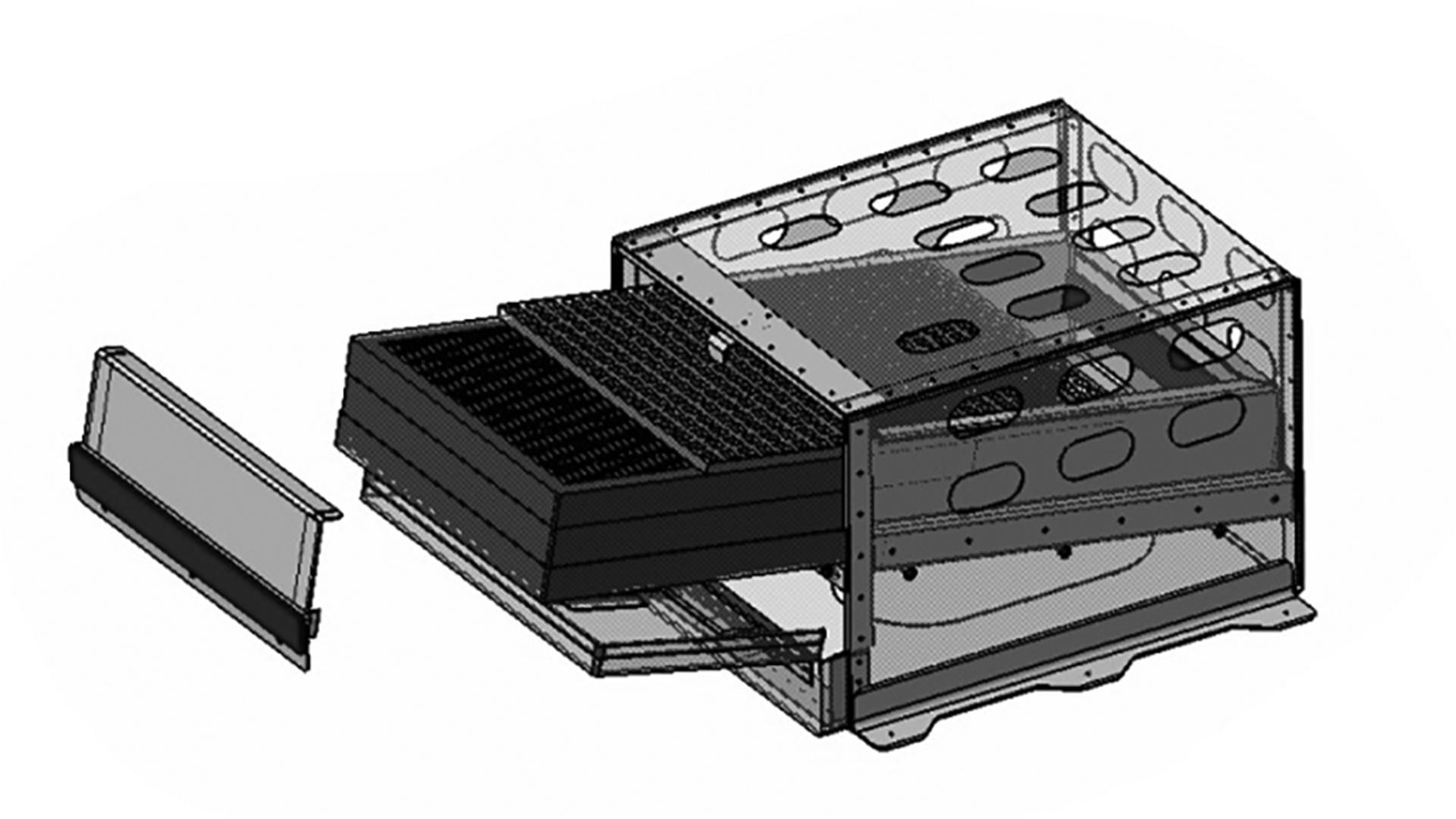
Collins Aerospace HEPA filter kit improves Dash 8 cabin air purity
Collins Aerospace Systems, a unit of Raytheon Technologies Corp., has developed and introduced the only Cabin Air Recirculation high-efficiency particulate air (HEPA) filter installation kit for use on Dash 8 (-100/-200/-300) aircraft. The HEPA filter kit mounts inside an aluminum enclosure along with a prefilter and together trap at least 99.97% of the harmful airborne particles that have a diameter of 0.3 micron. These include bacteria, viruses, pollen, dust, mites and other microscopic airborne contaminants in aircraft environmental control systems. To date, five separate airlines operating Dash 8 aircraft have placed orders and adopted the Collins Aerospace HEPA filter solution.

Hong Kong airport trials ‘CleanTech’ full-body disinfection channel

Edinburgh Airport upgrades security trays with Leidos antimicrobial technology
Edinburgh Airport is to upgrade the airport’s security tray return systems with Leidos antimicrobial tray technology. The implementation of antimicrobial technology complements other measures Edinburgh Airport is taking to minimize the spread of bacteria in the airport. This is Leidos’ first order of the antimicrobial security tray technology introduced to mitigate the spread of bacteria from person-to-surface contact.
Under the contract, Leidos will provide new antimicrobial security trays that prevent reproduction of a broad spectrum of bacteria, including staphylococcus aureus (staph), E. coli, and antibiotic-resistant bacteria like MRSA and VRE, by 99.99%. The antimicrobial technology is built into the security tray during Leidos’ tray manufacturing process and continuously minimizes the presence of microbes throughout the security tray’s lifecycle. The antimicrobial security trays must be cleaned according to normal hygiene procedures, but the additive will not wash off or wear away. The use of antimicrobial technology is important because studies have shown that microbes can survive on surfaces for up to eight weeks.
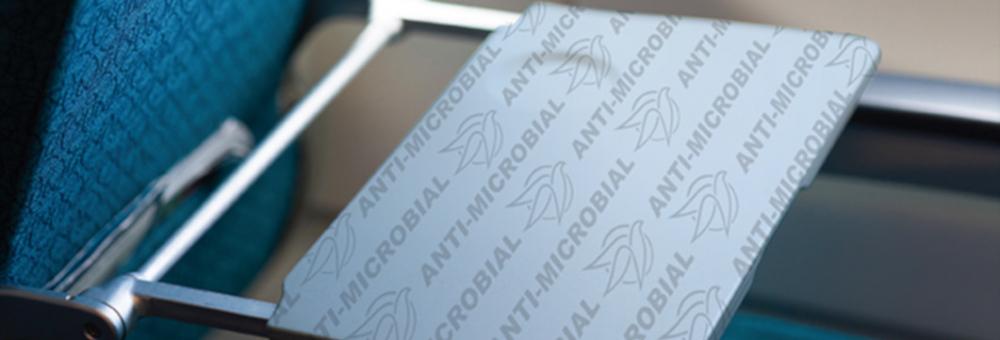
ADHETEC develops antibacterial, antiviral films for the cabin
Technical adhesives specialist ADHETEC has created a new range of antibacterial adhesive films to cover tray tables and IFE screens to enable a safe onboard environment.
According to the company, these antimicrobial self-adhesive films “allow immediate, stable and permanent microbial decontamination (including coronavirus) for a safe passenger inflight experience.”
ADHETEC claims its aerospace cabin antimicrobial products can destroy up to 99.999% of bacteria and viruses.
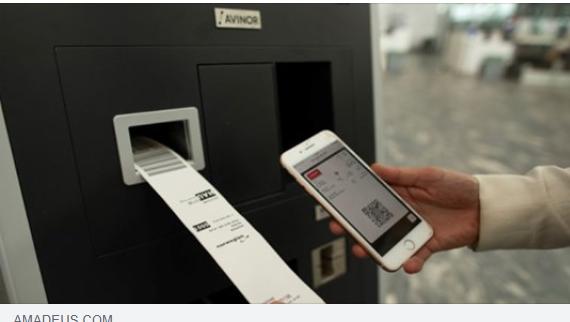
Norway airports, Amadeus partner on touchless travel
Norwegian airport operator Avinor is rolling out an end-to-end touchless travel program to help restore traveler confidence. Passengers traveling from Norway’s airports can check-in, drop their bags, pass through security, and board the aircraft without interpersonal contact, or the need to touch physical machines, thanks to new social distancing processes and technology from Amadeus and ICM, an Amadeus company.
Following deployment of the new approach, a passenger checks in for a flight remotely and receives a mobile boarding pass barcode, which also acts as a coupon to print the passenger’s bag tag. Upon arrival at the terminal, the passenger presents the barcode to a self-serve kiosk and the baggage tag is automatically printed.
Next, the passenger attaches the tag and deposits the bag into the baggage system with no support from agents required. Avinor’s in-house team have re-engineered their self-service bagdrop units with a new smart configuration of the existing barcode scanners and passenger dialogue in order to make the process touchless.
The new touchless experience will be available initially at Norway’s four hub airports: Oslo, Bergen, Stavanger and Trondheim. In total, 17 airports will be upgraded to deliver the nationwide touchless experience. The service will be available initially for passengers flying on the national carriers; SAS, Norwegian Air and Widerøe.
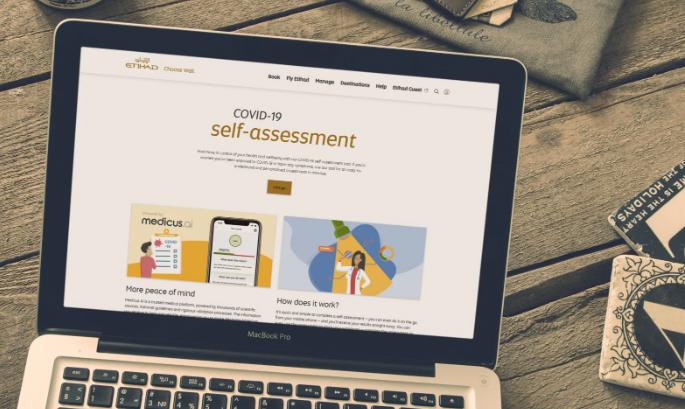
Etihad Airways launches COVID-19 risk-assessment tool
Etihad Airways is partnering with Austrian-based healthcare technology company Medicus AI to launch a COVID-19 risk-assessment tool that will empower guests to make informed decisions about traveling.
Powered by Medicus AI’s technology, the risk-assessment tool will guide Etihad’s guests in evaluating the probability of having contracted the COVID-19 coronavirus by responding to a set of 22 questions. The self-administered assessment, which takes less than five minutes to complete, is based on World Health Organization guidelines that are updated daily.
With this risk-assessment tool, guests will understand their individual probability of having contracted the virus alongside advisories and recommendations, allowing them to make informed decisions about traveling.
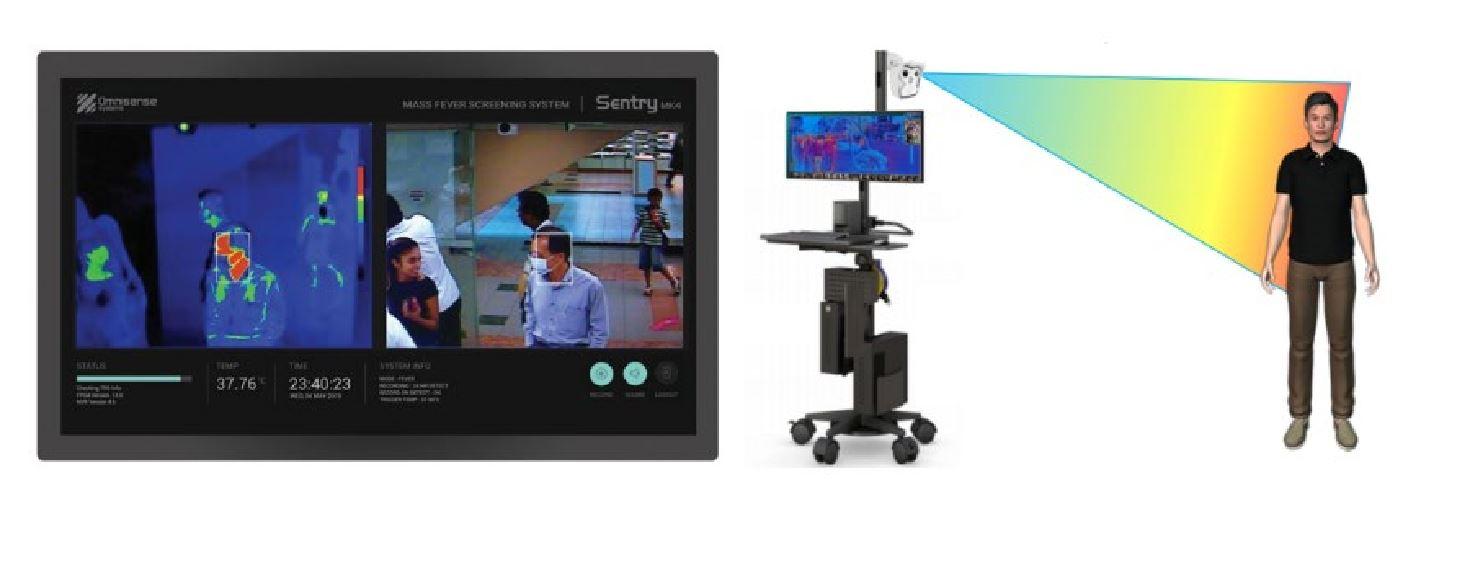
LAX launches thermal camera temperature technology
Los Angeles World Airports (LAWA) launched the Terminal Wellness Project deploying thermal camera technology that can help identify travelers with an elevated body temperature––the latest measure in the city’s continuing response to the COVID-19 health crisis.
Thermal cameras have been deployed at two locations inside the Tom Bradley International Terminal with both arriving and departing passengers screened. The cameras are designed to rapidly identify people with body temperatures of 100.4 degrees or more, which is the current guideline for detecting a fever set by the Centers for Disease Control and Prevention (CDC).
This is a voluntary program with signage alerting passengers where this trial will take place. If a voluntary participant is identified as having an elevated body temperature, a medical professional near the camera operator will approach the identified person and request a secondary screening using a handheld, non-contact thermometer. Departing guests who are identified as having an elevated body temperature will be advised that they should not travel. Passengers on arriving international flights identified as being potentially ill may be referred to CDC staff on site.
These thermal camera temperature checks will not replace other safety measures in place. To protect guest privacy, the cameras will not store, transmit, or share any data or images taken. Guests who decline to participate will have the opportunity to use a different pathway.
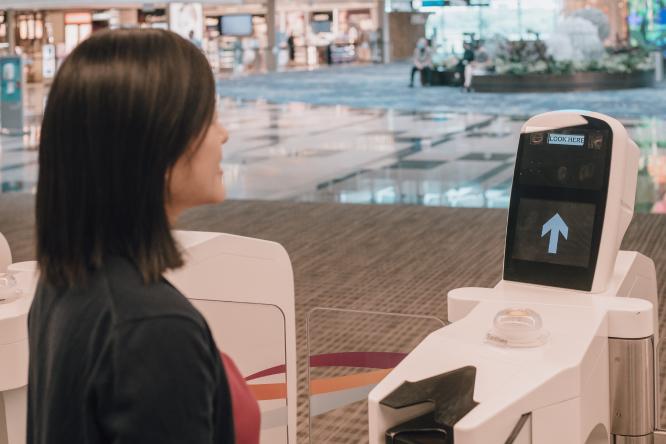
Changi Airport steps up innovations for safe, touchless travel
Singapore’s Changi Airport has stepped up measures and is exploring innovations to create a safer travel environment.
FAST check-in kiosks and bag-drop machines are fitted with proximity sensors so passengers will not need to touch the screens to check-in or to drop off their bags. Passengers just need to point their finger close to the screen to make their selections.
Auto-clearance immigration lanes are being upgraded with a new biometric system that uses face and iris recognition technology to match passengers with their travel documents. This replaces the need for traditional fingerprint-scanning.
All arriving, transit and departing passengers at Changi Airport, and staff entering the transit area, are subject to temperature screening. Anyone who is febrile or who appears unwell will be referred to a doctor on duty.
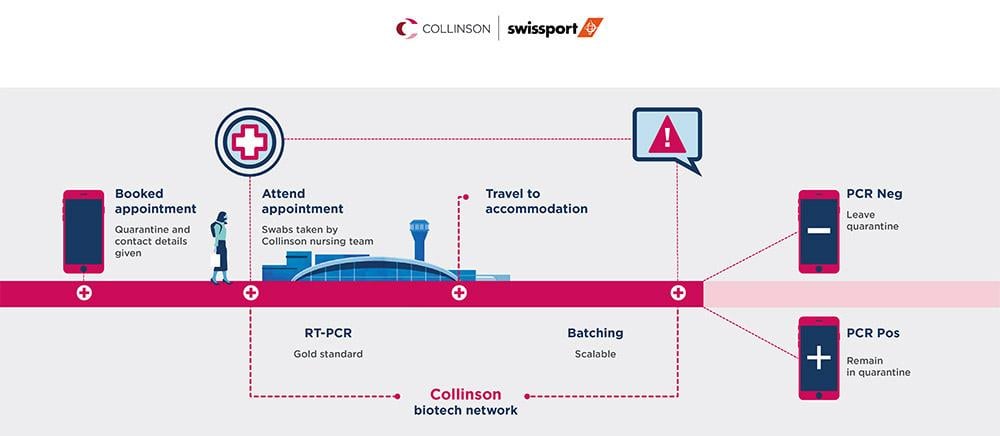
Collinson, Swissport partner on airport-based COVID-19 testing for UK arrivals
Collinson and Swissport are partnering to be able to offer airport-based COVID-19 testing to passengers arriving in the UK. The new process would mean passengers can be checked for COVID-19 upon arrival in the UK and know just hours later if they have tested positive for the virus. If added as an exception to their existing policy by the UK government, the tests could mean easing restrictions that would otherwise see every passenger needing to quarantine for 14 days when entering the UK. Under this proposal, inbound travelers who test negative would be exempt from quarantine, in the same way that cabin crew and some essential workers are already.
The two companies are hoping their “Test-on-Arrival” procedure could ease the way to widespread travel again, while maintaining public confidence in spread prevention.
Both companies have written to the Secretary of State for Transport of the UK, Grant Shapps, asking for his support with the pilot, and for travelers who have tested negative during the “Test-on-Arrival” process to be added as an additional category to the existing list of 42 exemptions from quarantine.
If the government incorporates the tests into its policy, passengers will be asked to continue to the quarantine address they provided at the time of booking while they await their test results, and will be asked to quarantine there until given the all-clear.

DUBZ introduces COVID-19 testing with home check-in service
As the aviation industry desperately tries to mitigate the spread of COVID-19 and begins to recover, technology companies are doubling down efforts to innovate solutions to make air travel safer to boost passenger confidence. Here are some of the latest innovations.
Get regular analysis and insights from Aviation Week Network’s award-winning editorial and data teams on technology and business advances impacting the global aviation, aerospace and defense industries
Not a subscriber? Sign up here.
